Impact of Effective Communication on Patient with Dementia
VerifiedAdded on 2023/01/23
|17
|5915
|21
AI Summary
This article discusses the impact of effective communication on patients with dementia. It explores the importance of effective communication in managing dementia patients and its effects on the patient, family, and society. Strategies for supporting individuals with dementia using effective communication are also discussed.
Contribute Materials
Your contribution can guide someone’s learning journey. Share your
documents today.
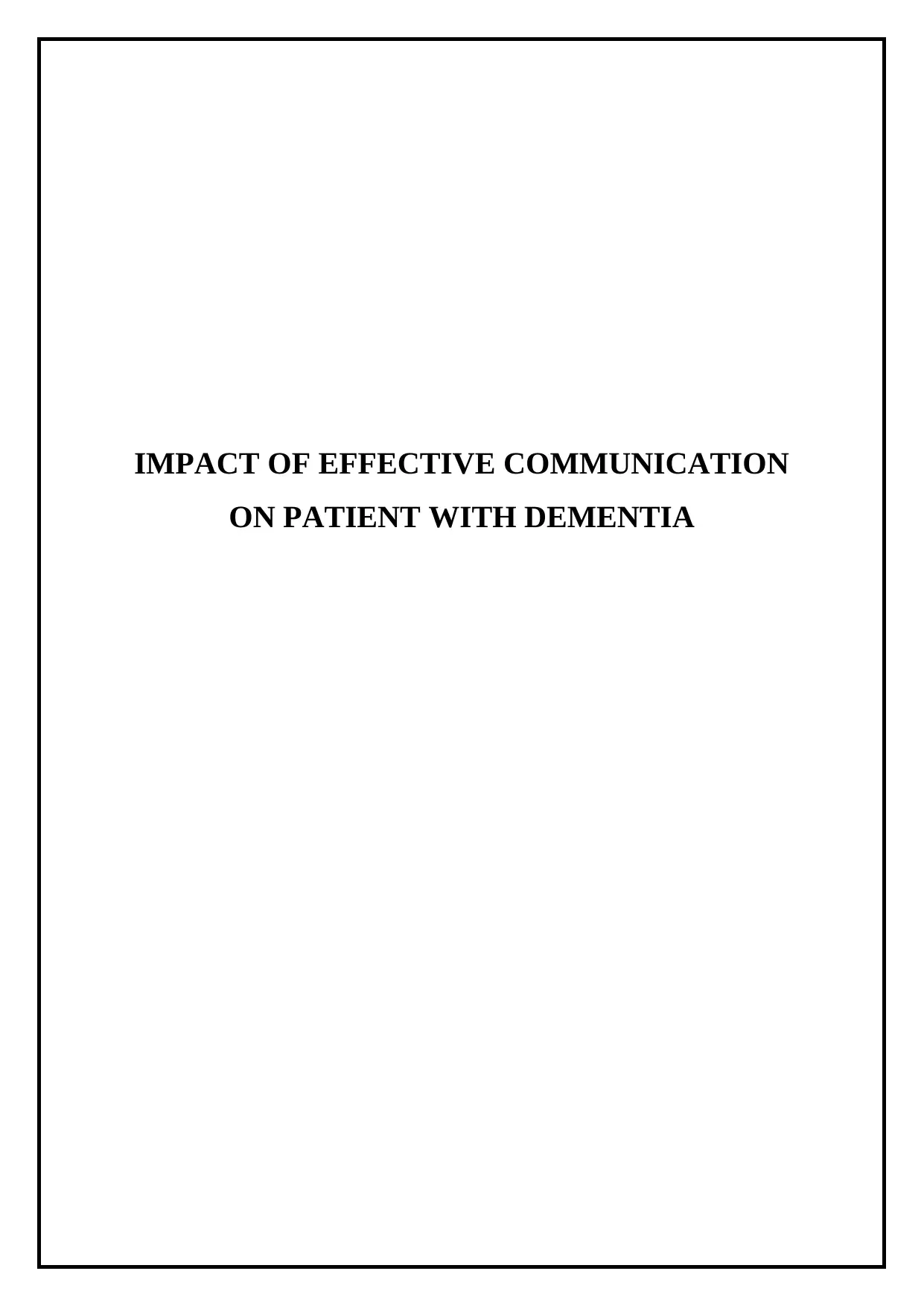
IMPACT OF EFFECTIVE COMMUNICATION
ON PATIENT WITH DEMENTIA
ON PATIENT WITH DEMENTIA
Secure Best Marks with AI Grader
Need help grading? Try our AI Grader for instant feedback on your assignments.
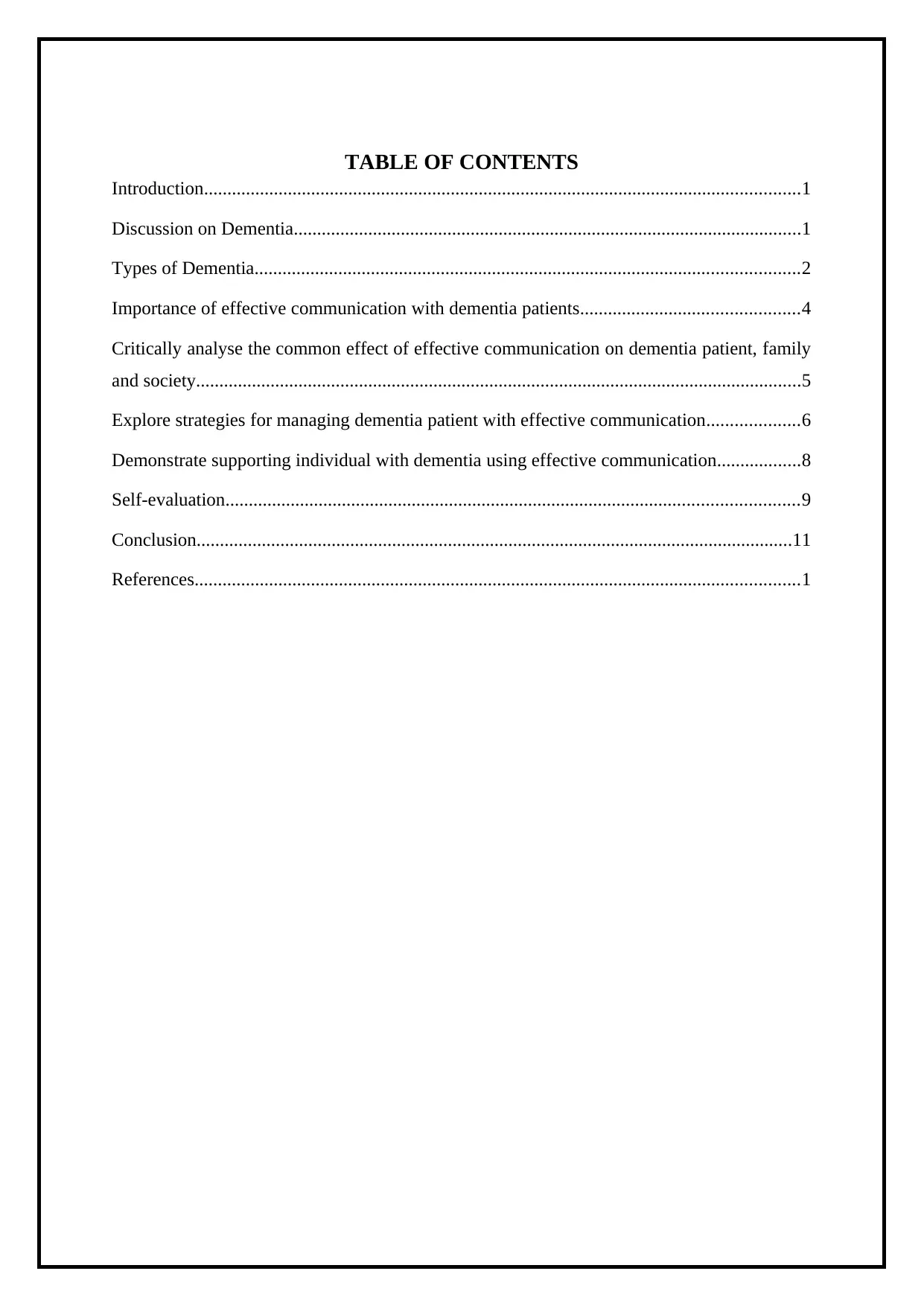
TABLE OF CONTENTS
Introduction................................................................................................................................1
Discussion on Dementia.............................................................................................................1
Types of Dementia.....................................................................................................................2
Importance of effective communication with dementia patients...............................................4
Critically analyse the common effect of effective communication on dementia patient, family
and society..................................................................................................................................5
Explore strategies for managing dementia patient with effective communication....................6
Demonstrate supporting individual with dementia using effective communication..................8
Self-evaluation...........................................................................................................................9
Conclusion................................................................................................................................11
References..................................................................................................................................1
Introduction................................................................................................................................1
Discussion on Dementia.............................................................................................................1
Types of Dementia.....................................................................................................................2
Importance of effective communication with dementia patients...............................................4
Critically analyse the common effect of effective communication on dementia patient, family
and society..................................................................................................................................5
Explore strategies for managing dementia patient with effective communication....................6
Demonstrate supporting individual with dementia using effective communication..................8
Self-evaluation...........................................................................................................................9
Conclusion................................................................................................................................11
References..................................................................................................................................1
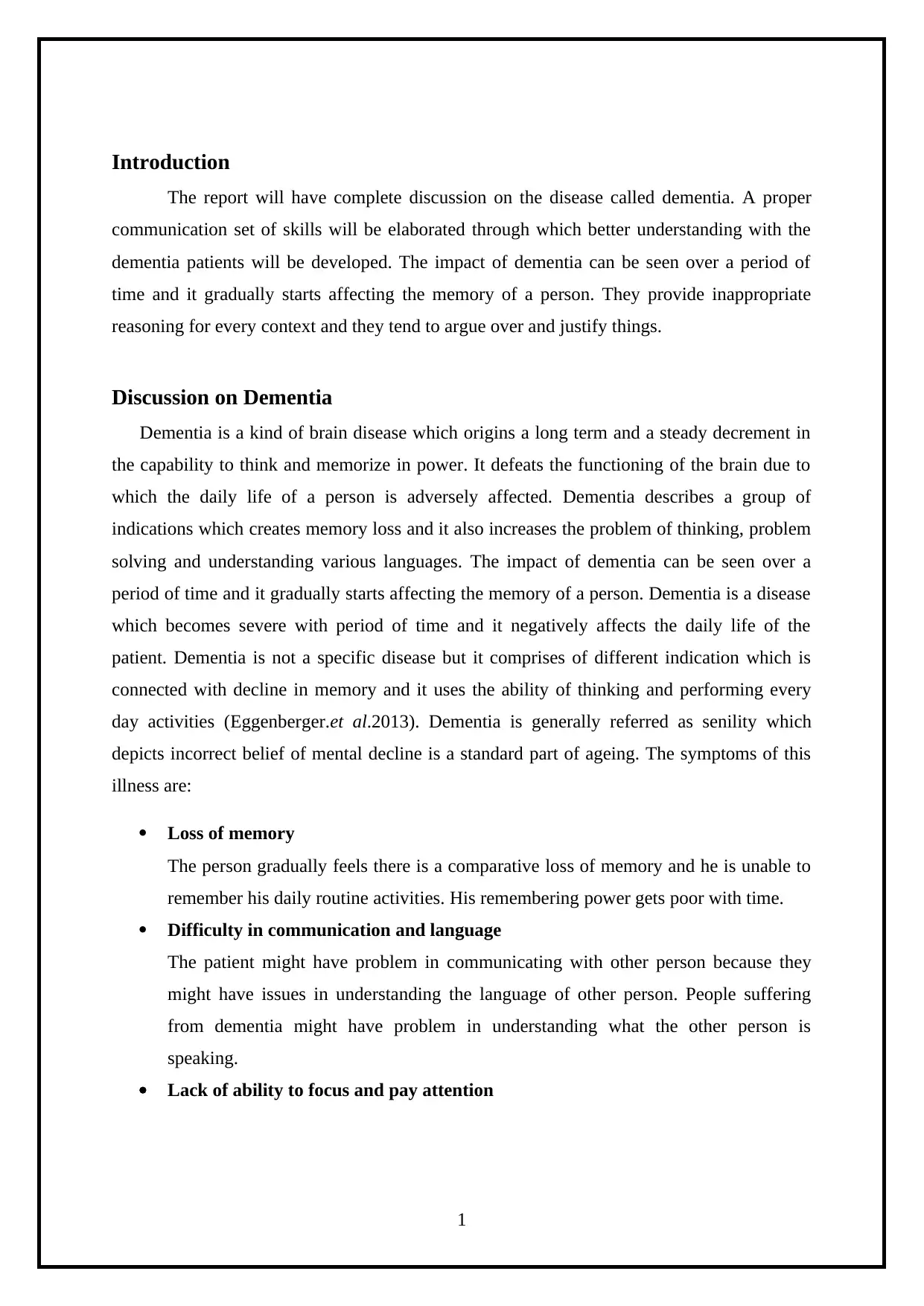
Introduction
The report will have complete discussion on the disease called dementia. A proper
communication set of skills will be elaborated through which better understanding with the
dementia patients will be developed. The impact of dementia can be seen over a period of
time and it gradually starts affecting the memory of a person. They provide inappropriate
reasoning for every context and they tend to argue over and justify things.
Discussion on Dementia
Dementia is a kind of brain disease which origins a long term and a steady decrement in
the capability to think and memorize in power. It defeats the functioning of the brain due to
which the daily life of a person is adversely affected. Dementia describes a group of
indications which creates memory loss and it also increases the problem of thinking, problem
solving and understanding various languages. The impact of dementia can be seen over a
period of time and it gradually starts affecting the memory of a person. Dementia is a disease
which becomes severe with period of time and it negatively affects the daily life of the
patient. Dementia is not a specific disease but it comprises of different indication which is
connected with decline in memory and it uses the ability of thinking and performing every
day activities (Eggenberger.et al.2013). Dementia is generally referred as senility which
depicts incorrect belief of mental decline is a standard part of ageing. The symptoms of this
illness are:
Loss of memory
The person gradually feels there is a comparative loss of memory and he is unable to
remember his daily routine activities. His remembering power gets poor with time.
Difficulty in communication and language
The patient might have problem in communicating with other person because they
might have issues in understanding the language of other person. People suffering
from dementia might have problem in understanding what the other person is
speaking.
Lack of ability to focus and pay attention
1
The report will have complete discussion on the disease called dementia. A proper
communication set of skills will be elaborated through which better understanding with the
dementia patients will be developed. The impact of dementia can be seen over a period of
time and it gradually starts affecting the memory of a person. They provide inappropriate
reasoning for every context and they tend to argue over and justify things.
Discussion on Dementia
Dementia is a kind of brain disease which origins a long term and a steady decrement in
the capability to think and memorize in power. It defeats the functioning of the brain due to
which the daily life of a person is adversely affected. Dementia describes a group of
indications which creates memory loss and it also increases the problem of thinking, problem
solving and understanding various languages. The impact of dementia can be seen over a
period of time and it gradually starts affecting the memory of a person. Dementia is a disease
which becomes severe with period of time and it negatively affects the daily life of the
patient. Dementia is not a specific disease but it comprises of different indication which is
connected with decline in memory and it uses the ability of thinking and performing every
day activities (Eggenberger.et al.2013). Dementia is generally referred as senility which
depicts incorrect belief of mental decline is a standard part of ageing. The symptoms of this
illness are:
Loss of memory
The person gradually feels there is a comparative loss of memory and he is unable to
remember his daily routine activities. His remembering power gets poor with time.
Difficulty in communication and language
The patient might have problem in communicating with other person because they
might have issues in understanding the language of other person. People suffering
from dementia might have problem in understanding what the other person is
speaking.
Lack of ability to focus and pay attention
1
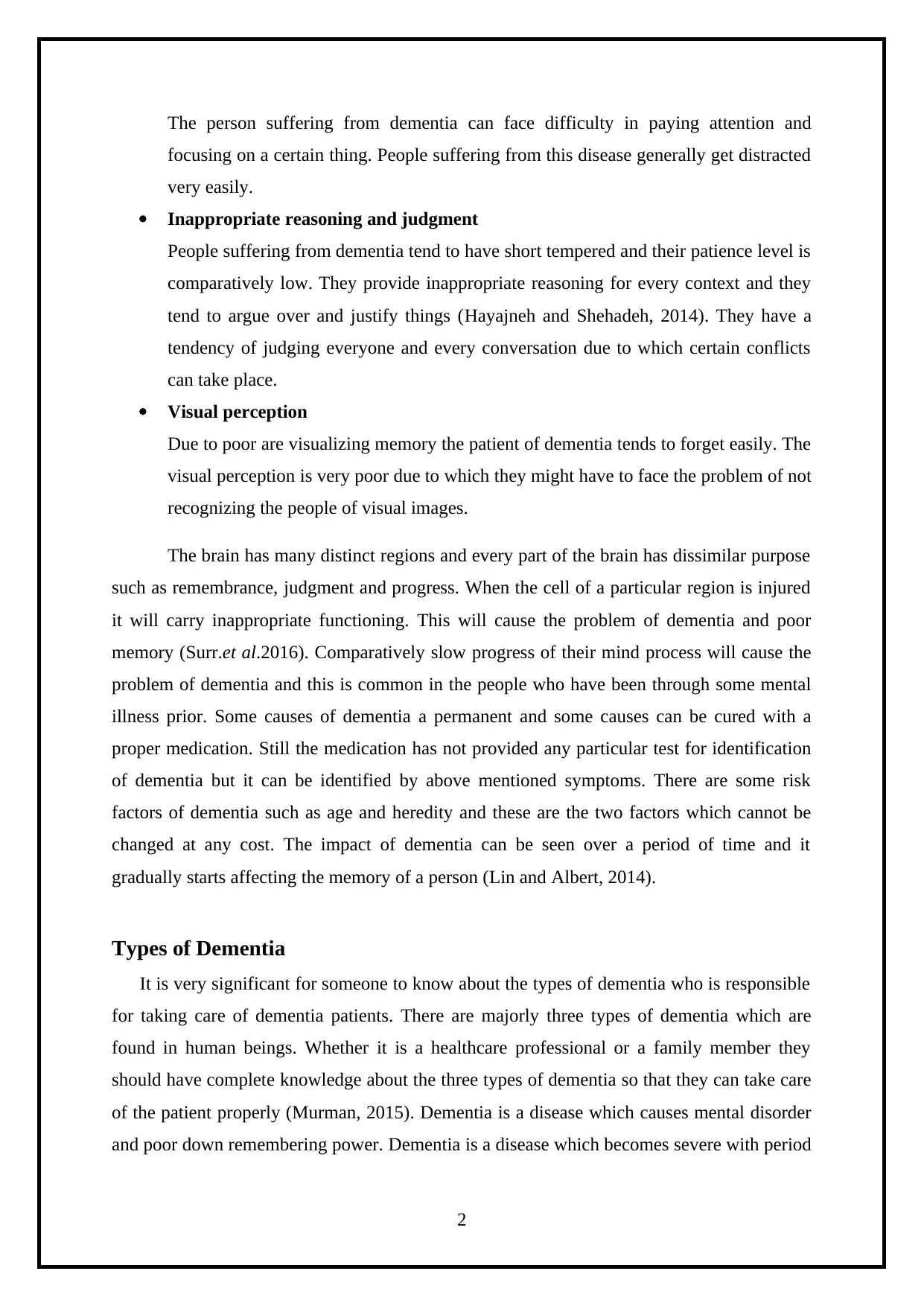
The person suffering from dementia can face difficulty in paying attention and
focusing on a certain thing. People suffering from this disease generally get distracted
very easily.
Inappropriate reasoning and judgment
People suffering from dementia tend to have short tempered and their patience level is
comparatively low. They provide inappropriate reasoning for every context and they
tend to argue over and justify things (Hayajneh and Shehadeh, 2014). They have a
tendency of judging everyone and every conversation due to which certain conflicts
can take place.
Visual perception
Due to poor are visualizing memory the patient of dementia tends to forget easily. The
visual perception is very poor due to which they might have to face the problem of not
recognizing the people of visual images.
The brain has many distinct regions and every part of the brain has dissimilar purpose
such as remembrance, judgment and progress. When the cell of a particular region is injured
it will carry inappropriate functioning. This will cause the problem of dementia and poor
memory (Surr.et al.2016). Comparatively slow progress of their mind process will cause the
problem of dementia and this is common in the people who have been through some mental
illness prior. Some causes of dementia a permanent and some causes can be cured with a
proper medication. Still the medication has not provided any particular test for identification
of dementia but it can be identified by above mentioned symptoms. There are some risk
factors of dementia such as age and heredity and these are the two factors which cannot be
changed at any cost. The impact of dementia can be seen over a period of time and it
gradually starts affecting the memory of a person (Lin and Albert, 2014).
Types of Dementia
It is very significant for someone to know about the types of dementia who is responsible
for taking care of dementia patients. There are majorly three types of dementia which are
found in human beings. Whether it is a healthcare professional or a family member they
should have complete knowledge about the three types of dementia so that they can take care
of the patient properly (Murman, 2015). Dementia is a disease which causes mental disorder
and poor down remembering power. Dementia is a disease which becomes severe with period
2
focusing on a certain thing. People suffering from this disease generally get distracted
very easily.
Inappropriate reasoning and judgment
People suffering from dementia tend to have short tempered and their patience level is
comparatively low. They provide inappropriate reasoning for every context and they
tend to argue over and justify things (Hayajneh and Shehadeh, 2014). They have a
tendency of judging everyone and every conversation due to which certain conflicts
can take place.
Visual perception
Due to poor are visualizing memory the patient of dementia tends to forget easily. The
visual perception is very poor due to which they might have to face the problem of not
recognizing the people of visual images.
The brain has many distinct regions and every part of the brain has dissimilar purpose
such as remembrance, judgment and progress. When the cell of a particular region is injured
it will carry inappropriate functioning. This will cause the problem of dementia and poor
memory (Surr.et al.2016). Comparatively slow progress of their mind process will cause the
problem of dementia and this is common in the people who have been through some mental
illness prior. Some causes of dementia a permanent and some causes can be cured with a
proper medication. Still the medication has not provided any particular test for identification
of dementia but it can be identified by above mentioned symptoms. There are some risk
factors of dementia such as age and heredity and these are the two factors which cannot be
changed at any cost. The impact of dementia can be seen over a period of time and it
gradually starts affecting the memory of a person (Lin and Albert, 2014).
Types of Dementia
It is very significant for someone to know about the types of dementia who is responsible
for taking care of dementia patients. There are majorly three types of dementia which are
found in human beings. Whether it is a healthcare professional or a family member they
should have complete knowledge about the three types of dementia so that they can take care
of the patient properly (Murman, 2015). Dementia is a disease which causes mental disorder
and poor down remembering power. Dementia is a disease which becomes severe with period
2
Secure Best Marks with AI Grader
Need help grading? Try our AI Grader for instant feedback on your assignments.
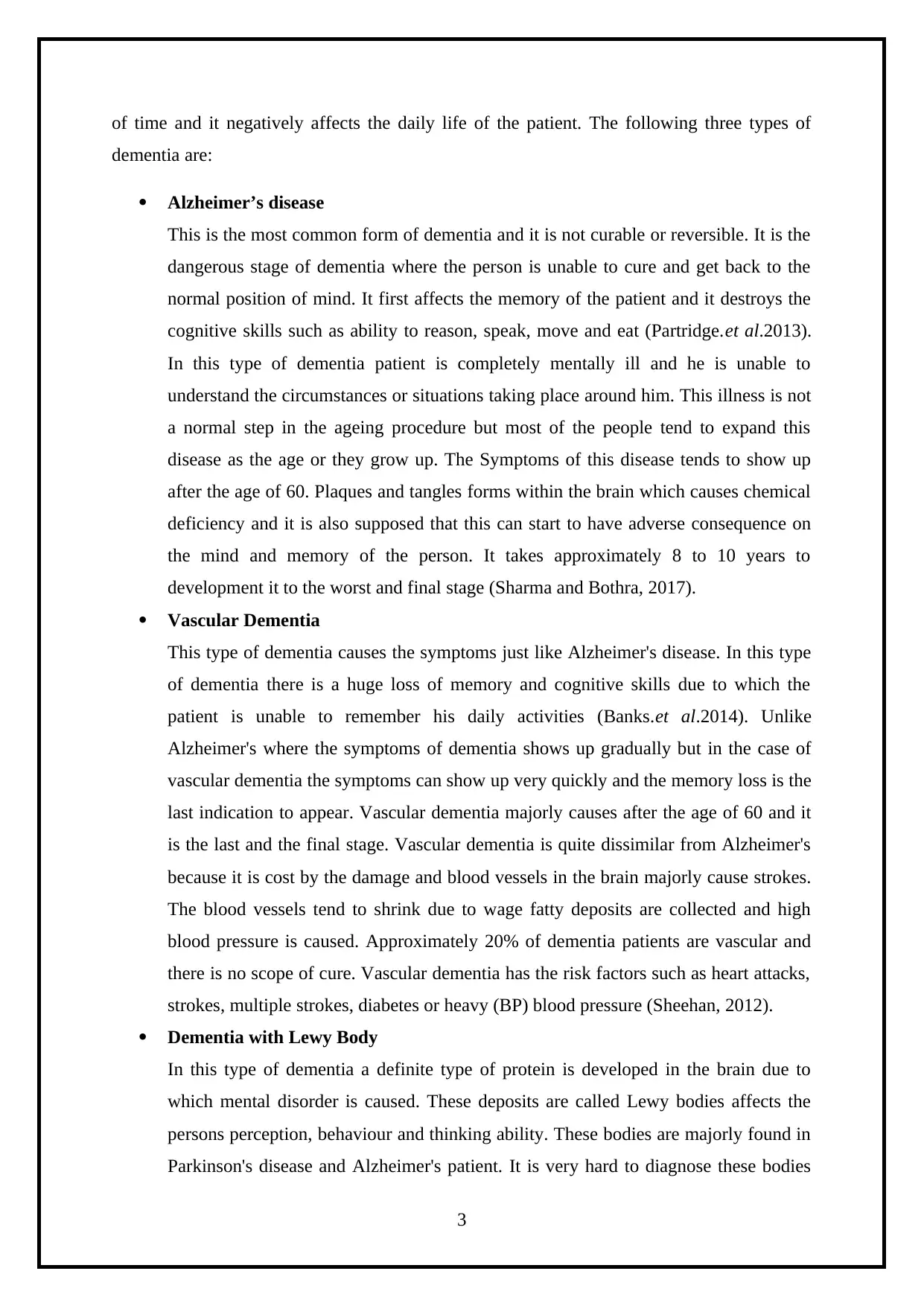
of time and it negatively affects the daily life of the patient. The following three types of
dementia are:
Alzheimer’s disease
This is the most common form of dementia and it is not curable or reversible. It is the
dangerous stage of dementia where the person is unable to cure and get back to the
normal position of mind. It first affects the memory of the patient and it destroys the
cognitive skills such as ability to reason, speak, move and eat (Partridge.et al.2013).
In this type of dementia patient is completely mentally ill and he is unable to
understand the circumstances or situations taking place around him. This illness is not
a normal step in the ageing procedure but most of the people tend to expand this
disease as the age or they grow up. The Symptoms of this disease tends to show up
after the age of 60. Plaques and tangles forms within the brain which causes chemical
deficiency and it is also supposed that this can start to have adverse consequence on
the mind and memory of the person. It takes approximately 8 to 10 years to
development it to the worst and final stage (Sharma and Bothra, 2017).
Vascular Dementia
This type of dementia causes the symptoms just like Alzheimer's disease. In this type
of dementia there is a huge loss of memory and cognitive skills due to which the
patient is unable to remember his daily activities (Banks.et al.2014). Unlike
Alzheimer's where the symptoms of dementia shows up gradually but in the case of
vascular dementia the symptoms can show up very quickly and the memory loss is the
last indication to appear. Vascular dementia majorly causes after the age of 60 and it
is the last and the final stage. Vascular dementia is quite dissimilar from Alzheimer's
because it is cost by the damage and blood vessels in the brain majorly cause strokes.
The blood vessels tend to shrink due to wage fatty deposits are collected and high
blood pressure is caused. Approximately 20% of dementia patients are vascular and
there is no scope of cure. Vascular dementia has the risk factors such as heart attacks,
strokes, multiple strokes, diabetes or heavy (BP) blood pressure (Sheehan, 2012).
Dementia with Lewy Body
In this type of dementia a definite type of protein is developed in the brain due to
which mental disorder is caused. These deposits are called Lewy bodies affects the
persons perception, behaviour and thinking ability. These bodies are majorly found in
Parkinson's disease and Alzheimer's patient. It is very hard to diagnose these bodies
3
dementia are:
Alzheimer’s disease
This is the most common form of dementia and it is not curable or reversible. It is the
dangerous stage of dementia where the person is unable to cure and get back to the
normal position of mind. It first affects the memory of the patient and it destroys the
cognitive skills such as ability to reason, speak, move and eat (Partridge.et al.2013).
In this type of dementia patient is completely mentally ill and he is unable to
understand the circumstances or situations taking place around him. This illness is not
a normal step in the ageing procedure but most of the people tend to expand this
disease as the age or they grow up. The Symptoms of this disease tends to show up
after the age of 60. Plaques and tangles forms within the brain which causes chemical
deficiency and it is also supposed that this can start to have adverse consequence on
the mind and memory of the person. It takes approximately 8 to 10 years to
development it to the worst and final stage (Sharma and Bothra, 2017).
Vascular Dementia
This type of dementia causes the symptoms just like Alzheimer's disease. In this type
of dementia there is a huge loss of memory and cognitive skills due to which the
patient is unable to remember his daily activities (Banks.et al.2014). Unlike
Alzheimer's where the symptoms of dementia shows up gradually but in the case of
vascular dementia the symptoms can show up very quickly and the memory loss is the
last indication to appear. Vascular dementia majorly causes after the age of 60 and it
is the last and the final stage. Vascular dementia is quite dissimilar from Alzheimer's
because it is cost by the damage and blood vessels in the brain majorly cause strokes.
The blood vessels tend to shrink due to wage fatty deposits are collected and high
blood pressure is caused. Approximately 20% of dementia patients are vascular and
there is no scope of cure. Vascular dementia has the risk factors such as heart attacks,
strokes, multiple strokes, diabetes or heavy (BP) blood pressure (Sheehan, 2012).
Dementia with Lewy Body
In this type of dementia a definite type of protein is developed in the brain due to
which mental disorder is caused. These deposits are called Lewy bodies affects the
persons perception, behaviour and thinking ability. These bodies are majorly found in
Parkinson's disease and Alzheimer's patient. It is very hard to diagnose these bodies
3
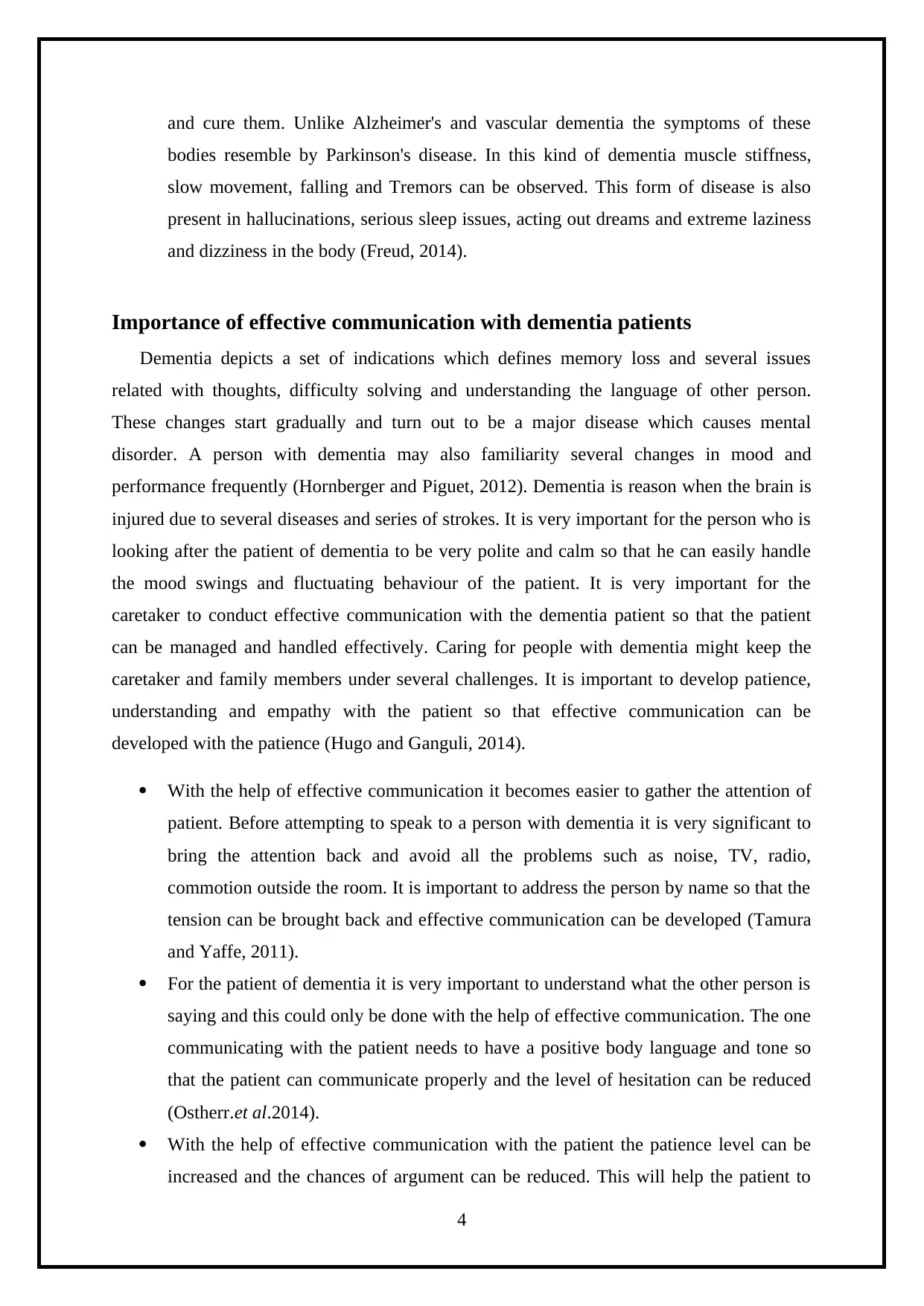
and cure them. Unlike Alzheimer's and vascular dementia the symptoms of these
bodies resemble by Parkinson's disease. In this kind of dementia muscle stiffness,
slow movement, falling and Tremors can be observed. This form of disease is also
present in hallucinations, serious sleep issues, acting out dreams and extreme laziness
and dizziness in the body (Freud, 2014).
Importance of effective communication with dementia patients
Dementia depicts a set of indications which defines memory loss and several issues
related with thoughts, difficulty solving and understanding the language of other person.
These changes start gradually and turn out to be a major disease which causes mental
disorder. A person with dementia may also familiarity several changes in mood and
performance frequently (Hornberger and Piguet, 2012). Dementia is reason when the brain is
injured due to several diseases and series of strokes. It is very important for the person who is
looking after the patient of dementia to be very polite and calm so that he can easily handle
the mood swings and fluctuating behaviour of the patient. It is very important for the
caretaker to conduct effective communication with the dementia patient so that the patient
can be managed and handled effectively. Caring for people with dementia might keep the
caretaker and family members under several challenges. It is important to develop patience,
understanding and empathy with the patient so that effective communication can be
developed with the patience (Hugo and Ganguli, 2014).
With the help of effective communication it becomes easier to gather the attention of
patient. Before attempting to speak to a person with dementia it is very significant to
bring the attention back and avoid all the problems such as noise, TV, radio,
commotion outside the room. It is important to address the person by name so that the
tension can be brought back and effective communication can be developed (Tamura
and Yaffe, 2011).
For the patient of dementia it is very important to understand what the other person is
saying and this could only be done with the help of effective communication. The one
communicating with the patient needs to have a positive body language and tone so
that the patient can communicate properly and the level of hesitation can be reduced
(Ostherr.et al.2014).
With the help of effective communication with the patient the patience level can be
increased and the chances of argument can be reduced. This will help the patient to
4
bodies resemble by Parkinson's disease. In this kind of dementia muscle stiffness,
slow movement, falling and Tremors can be observed. This form of disease is also
present in hallucinations, serious sleep issues, acting out dreams and extreme laziness
and dizziness in the body (Freud, 2014).
Importance of effective communication with dementia patients
Dementia depicts a set of indications which defines memory loss and several issues
related with thoughts, difficulty solving and understanding the language of other person.
These changes start gradually and turn out to be a major disease which causes mental
disorder. A person with dementia may also familiarity several changes in mood and
performance frequently (Hornberger and Piguet, 2012). Dementia is reason when the brain is
injured due to several diseases and series of strokes. It is very important for the person who is
looking after the patient of dementia to be very polite and calm so that he can easily handle
the mood swings and fluctuating behaviour of the patient. It is very important for the
caretaker to conduct effective communication with the dementia patient so that the patient
can be managed and handled effectively. Caring for people with dementia might keep the
caretaker and family members under several challenges. It is important to develop patience,
understanding and empathy with the patient so that effective communication can be
developed with the patience (Hugo and Ganguli, 2014).
With the help of effective communication it becomes easier to gather the attention of
patient. Before attempting to speak to a person with dementia it is very significant to
bring the attention back and avoid all the problems such as noise, TV, radio,
commotion outside the room. It is important to address the person by name so that the
tension can be brought back and effective communication can be developed (Tamura
and Yaffe, 2011).
For the patient of dementia it is very important to understand what the other person is
saying and this could only be done with the help of effective communication. The one
communicating with the patient needs to have a positive body language and tone so
that the patient can communicate properly and the level of hesitation can be reduced
(Ostherr.et al.2014).
With the help of effective communication with the patient the patience level can be
increased and the chances of argument can be reduced. This will help the patient to
4
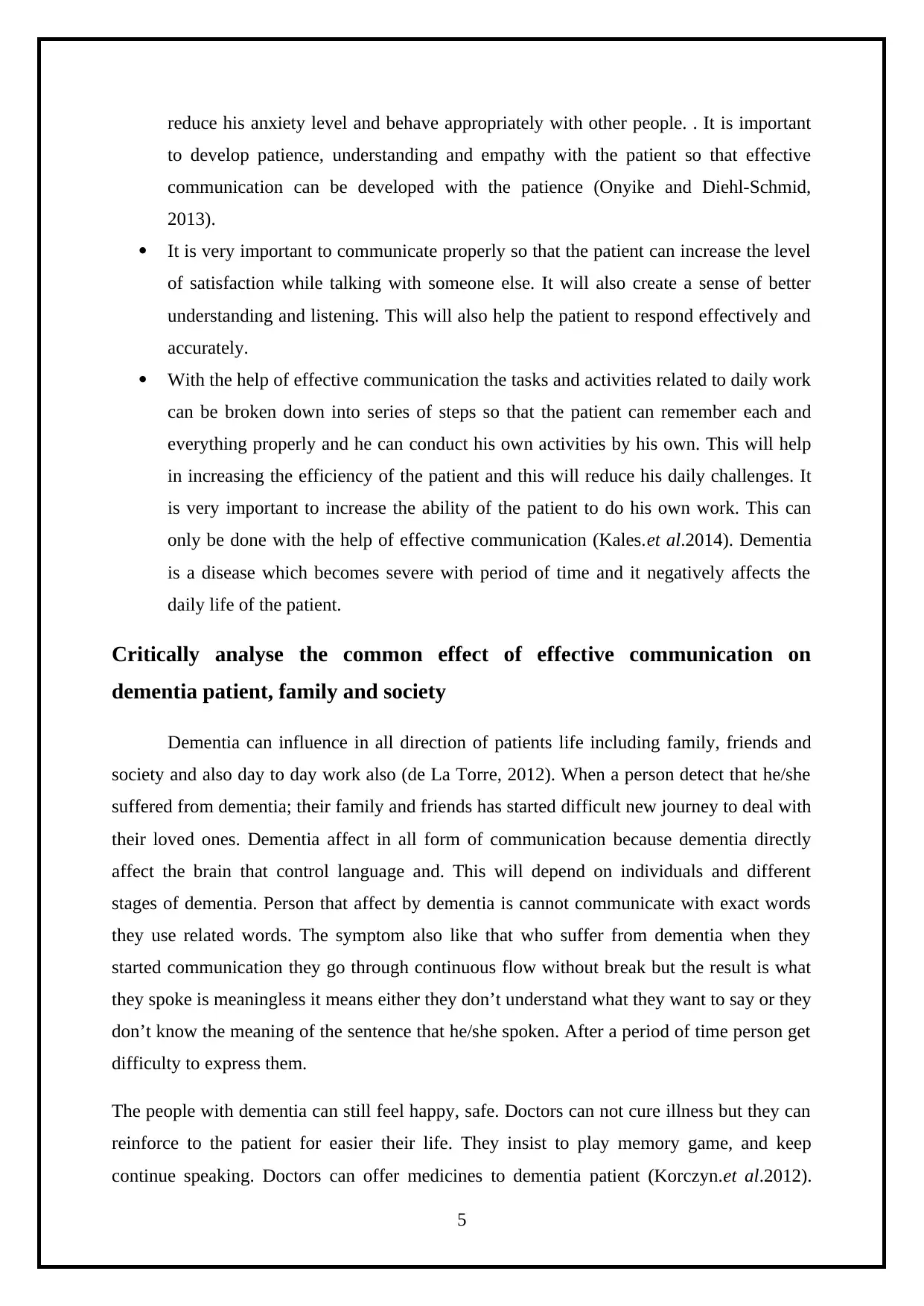
reduce his anxiety level and behave appropriately with other people. . It is important
to develop patience, understanding and empathy with the patient so that effective
communication can be developed with the patience (Onyike and Diehl-Schmid,
2013).
It is very important to communicate properly so that the patient can increase the level
of satisfaction while talking with someone else. It will also create a sense of better
understanding and listening. This will also help the patient to respond effectively and
accurately.
With the help of effective communication the tasks and activities related to daily work
can be broken down into series of steps so that the patient can remember each and
everything properly and he can conduct his own activities by his own. This will help
in increasing the efficiency of the patient and this will reduce his daily challenges. It
is very important to increase the ability of the patient to do his own work. This can
only be done with the help of effective communication (Kales.et al.2014). Dementia
is a disease which becomes severe with period of time and it negatively affects the
daily life of the patient.
Critically analyse the common effect of effective communication on
dementia patient, family and society
Dementia can influence in all direction of patients life including family, friends and
society and also day to day work also (de La Torre, 2012). When a person detect that he/she
suffered from dementia; their family and friends has started difficult new journey to deal with
their loved ones. Dementia affect in all form of communication because dementia directly
affect the brain that control language and. This will depend on individuals and different
stages of dementia. Person that affect by dementia is cannot communicate with exact words
they use related words. The symptom also like that who suffer from dementia when they
started communication they go through continuous flow without break but the result is what
they spoke is meaningless it means either they don’t understand what they want to say or they
don’t know the meaning of the sentence that he/she spoken. After a period of time person get
difficulty to express them.
The people with dementia can still feel happy, safe. Doctors can not cure illness but they can
reinforce to the patient for easier their life. They insist to play memory game, and keep
continue speaking. Doctors can offer medicines to dementia patient (Korczyn.et al.2012).
5
to develop patience, understanding and empathy with the patient so that effective
communication can be developed with the patience (Onyike and Diehl-Schmid,
2013).
It is very important to communicate properly so that the patient can increase the level
of satisfaction while talking with someone else. It will also create a sense of better
understanding and listening. This will also help the patient to respond effectively and
accurately.
With the help of effective communication the tasks and activities related to daily work
can be broken down into series of steps so that the patient can remember each and
everything properly and he can conduct his own activities by his own. This will help
in increasing the efficiency of the patient and this will reduce his daily challenges. It
is very important to increase the ability of the patient to do his own work. This can
only be done with the help of effective communication (Kales.et al.2014). Dementia
is a disease which becomes severe with period of time and it negatively affects the
daily life of the patient.
Critically analyse the common effect of effective communication on
dementia patient, family and society
Dementia can influence in all direction of patients life including family, friends and
society and also day to day work also (de La Torre, 2012). When a person detect that he/she
suffered from dementia; their family and friends has started difficult new journey to deal with
their loved ones. Dementia affect in all form of communication because dementia directly
affect the brain that control language and. This will depend on individuals and different
stages of dementia. Person that affect by dementia is cannot communicate with exact words
they use related words. The symptom also like that who suffer from dementia when they
started communication they go through continuous flow without break but the result is what
they spoke is meaningless it means either they don’t understand what they want to say or they
don’t know the meaning of the sentence that he/she spoken. After a period of time person get
difficulty to express them.
The people with dementia can still feel happy, safe. Doctors can not cure illness but they can
reinforce to the patient for easier their life. They insist to play memory game, and keep
continue speaking. Doctors can offer medicines to dementia patient (Korczyn.et al.2012).
5
Paraphrase This Document
Need a fresh take? Get an instant paraphrase of this document with our AI Paraphraser
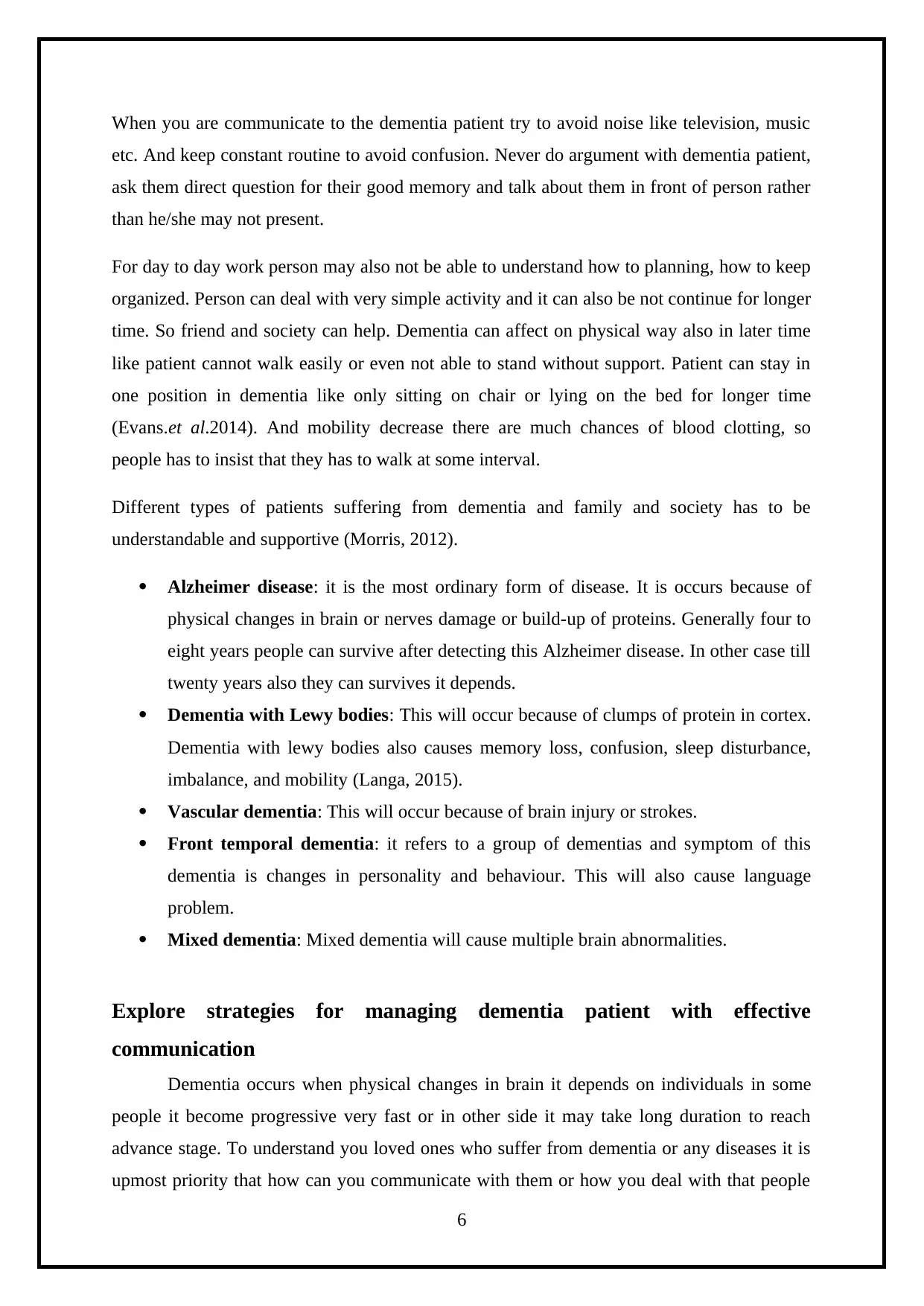
When you are communicate to the dementia patient try to avoid noise like television, music
etc. And keep constant routine to avoid confusion. Never do argument with dementia patient,
ask them direct question for their good memory and talk about them in front of person rather
than he/she may not present.
For day to day work person may also not be able to understand how to planning, how to keep
organized. Person can deal with very simple activity and it can also be not continue for longer
time. So friend and society can help. Dementia can affect on physical way also in later time
like patient cannot walk easily or even not able to stand without support. Patient can stay in
one position in dementia like only sitting on chair or lying on the bed for longer time
(Evans.et al.2014). And mobility decrease there are much chances of blood clotting, so
people has to insist that they has to walk at some interval.
Different types of patients suffering from dementia and family and society has to be
understandable and supportive (Morris, 2012).
Alzheimer disease: it is the most ordinary form of disease. It is occurs because of
physical changes in brain or nerves damage or build-up of proteins. Generally four to
eight years people can survive after detecting this Alzheimer disease. In other case till
twenty years also they can survives it depends.
Dementia with Lewy bodies: This will occur because of clumps of protein in cortex.
Dementia with lewy bodies also causes memory loss, confusion, sleep disturbance,
imbalance, and mobility (Langa, 2015).
Vascular dementia: This will occur because of brain injury or strokes.
Front temporal dementia: it refers to a group of dementias and symptom of this
dementia is changes in personality and behaviour. This will also cause language
problem.
Mixed dementia: Mixed dementia will cause multiple brain abnormalities.
Explore strategies for managing dementia patient with effective
communication
Dementia occurs when physical changes in brain it depends on individuals in some
people it become progressive very fast or in other side it may take long duration to reach
advance stage. To understand you loved ones who suffer from dementia or any diseases it is
upmost priority that how can you communicate with them or how you deal with that people
6
etc. And keep constant routine to avoid confusion. Never do argument with dementia patient,
ask them direct question for their good memory and talk about them in front of person rather
than he/she may not present.
For day to day work person may also not be able to understand how to planning, how to keep
organized. Person can deal with very simple activity and it can also be not continue for longer
time. So friend and society can help. Dementia can affect on physical way also in later time
like patient cannot walk easily or even not able to stand without support. Patient can stay in
one position in dementia like only sitting on chair or lying on the bed for longer time
(Evans.et al.2014). And mobility decrease there are much chances of blood clotting, so
people has to insist that they has to walk at some interval.
Different types of patients suffering from dementia and family and society has to be
understandable and supportive (Morris, 2012).
Alzheimer disease: it is the most ordinary form of disease. It is occurs because of
physical changes in brain or nerves damage or build-up of proteins. Generally four to
eight years people can survive after detecting this Alzheimer disease. In other case till
twenty years also they can survives it depends.
Dementia with Lewy bodies: This will occur because of clumps of protein in cortex.
Dementia with lewy bodies also causes memory loss, confusion, sleep disturbance,
imbalance, and mobility (Langa, 2015).
Vascular dementia: This will occur because of brain injury or strokes.
Front temporal dementia: it refers to a group of dementias and symptom of this
dementia is changes in personality and behaviour. This will also cause language
problem.
Mixed dementia: Mixed dementia will cause multiple brain abnormalities.
Explore strategies for managing dementia patient with effective
communication
Dementia occurs when physical changes in brain it depends on individuals in some
people it become progressive very fast or in other side it may take long duration to reach
advance stage. To understand you loved ones who suffer from dementia or any diseases it is
upmost priority that how can you communicate with them or how you deal with that people
6
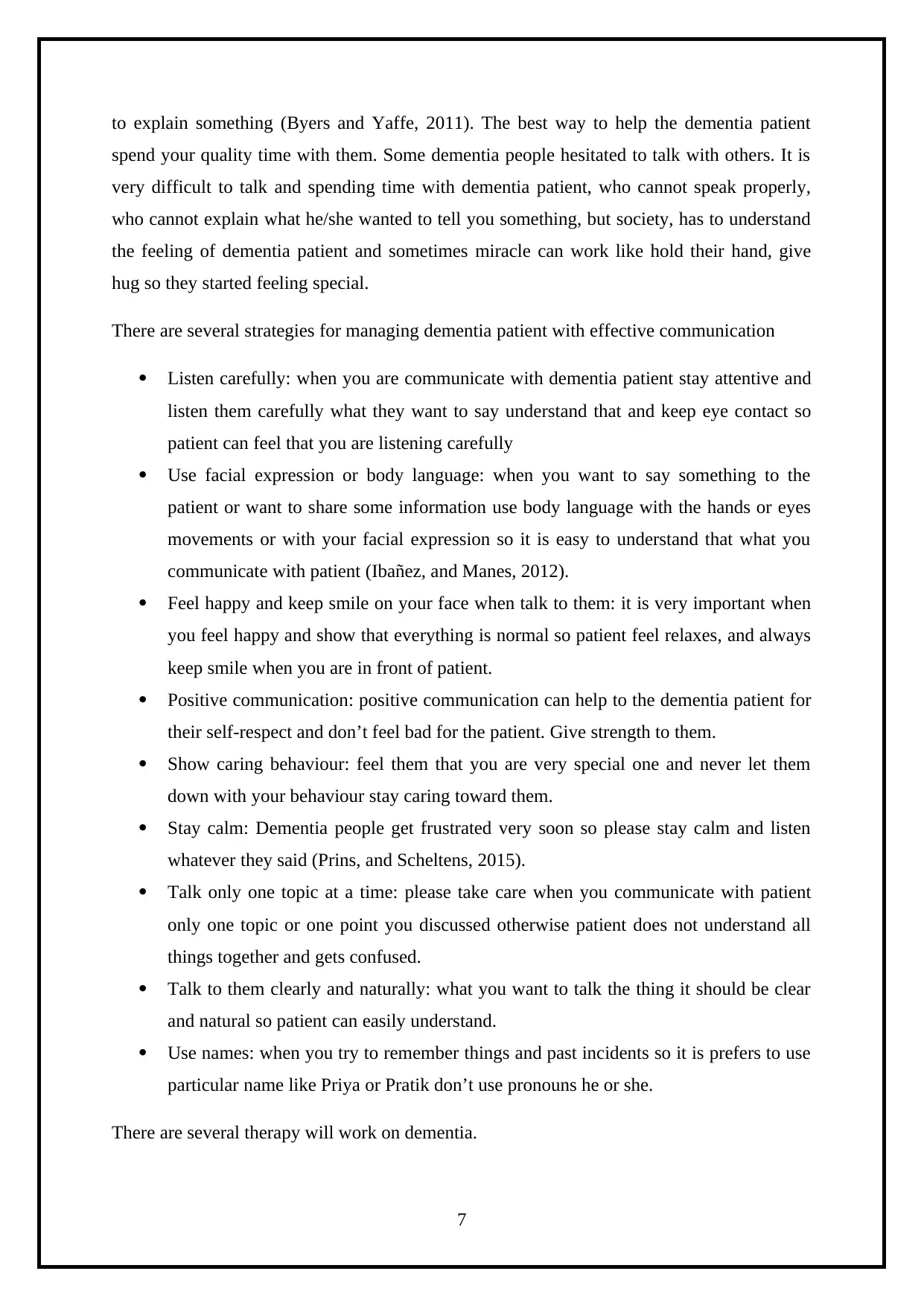
to explain something (Byers and Yaffe, 2011). The best way to help the dementia patient
spend your quality time with them. Some dementia people hesitated to talk with others. It is
very difficult to talk and spending time with dementia patient, who cannot speak properly,
who cannot explain what he/she wanted to tell you something, but society, has to understand
the feeling of dementia patient and sometimes miracle can work like hold their hand, give
hug so they started feeling special.
There are several strategies for managing dementia patient with effective communication
Listen carefully: when you are communicate with dementia patient stay attentive and
listen them carefully what they want to say understand that and keep eye contact so
patient can feel that you are listening carefully
Use facial expression or body language: when you want to say something to the
patient or want to share some information use body language with the hands or eyes
movements or with your facial expression so it is easy to understand that what you
communicate with patient (Ibañez, and Manes, 2012).
Feel happy and keep smile on your face when talk to them: it is very important when
you feel happy and show that everything is normal so patient feel relaxes, and always
keep smile when you are in front of patient.
Positive communication: positive communication can help to the dementia patient for
their self-respect and don’t feel bad for the patient. Give strength to them.
Show caring behaviour: feel them that you are very special one and never let them
down with your behaviour stay caring toward them.
Stay calm: Dementia people get frustrated very soon so please stay calm and listen
whatever they said (Prins, and Scheltens, 2015).
Talk only one topic at a time: please take care when you communicate with patient
only one topic or one point you discussed otherwise patient does not understand all
things together and gets confused.
Talk to them clearly and naturally: what you want to talk the thing it should be clear
and natural so patient can easily understand.
Use names: when you try to remember things and past incidents so it is prefers to use
particular name like Priya or Pratik don’t use pronouns he or she.
There are several therapy will work on dementia.
7
spend your quality time with them. Some dementia people hesitated to talk with others. It is
very difficult to talk and spending time with dementia patient, who cannot speak properly,
who cannot explain what he/she wanted to tell you something, but society, has to understand
the feeling of dementia patient and sometimes miracle can work like hold their hand, give
hug so they started feeling special.
There are several strategies for managing dementia patient with effective communication
Listen carefully: when you are communicate with dementia patient stay attentive and
listen them carefully what they want to say understand that and keep eye contact so
patient can feel that you are listening carefully
Use facial expression or body language: when you want to say something to the
patient or want to share some information use body language with the hands or eyes
movements or with your facial expression so it is easy to understand that what you
communicate with patient (Ibañez, and Manes, 2012).
Feel happy and keep smile on your face when talk to them: it is very important when
you feel happy and show that everything is normal so patient feel relaxes, and always
keep smile when you are in front of patient.
Positive communication: positive communication can help to the dementia patient for
their self-respect and don’t feel bad for the patient. Give strength to them.
Show caring behaviour: feel them that you are very special one and never let them
down with your behaviour stay caring toward them.
Stay calm: Dementia people get frustrated very soon so please stay calm and listen
whatever they said (Prins, and Scheltens, 2015).
Talk only one topic at a time: please take care when you communicate with patient
only one topic or one point you discussed otherwise patient does not understand all
things together and gets confused.
Talk to them clearly and naturally: what you want to talk the thing it should be clear
and natural so patient can easily understand.
Use names: when you try to remember things and past incidents so it is prefers to use
particular name like Priya or Pratik don’t use pronouns he or she.
There are several therapy will work on dementia.
7
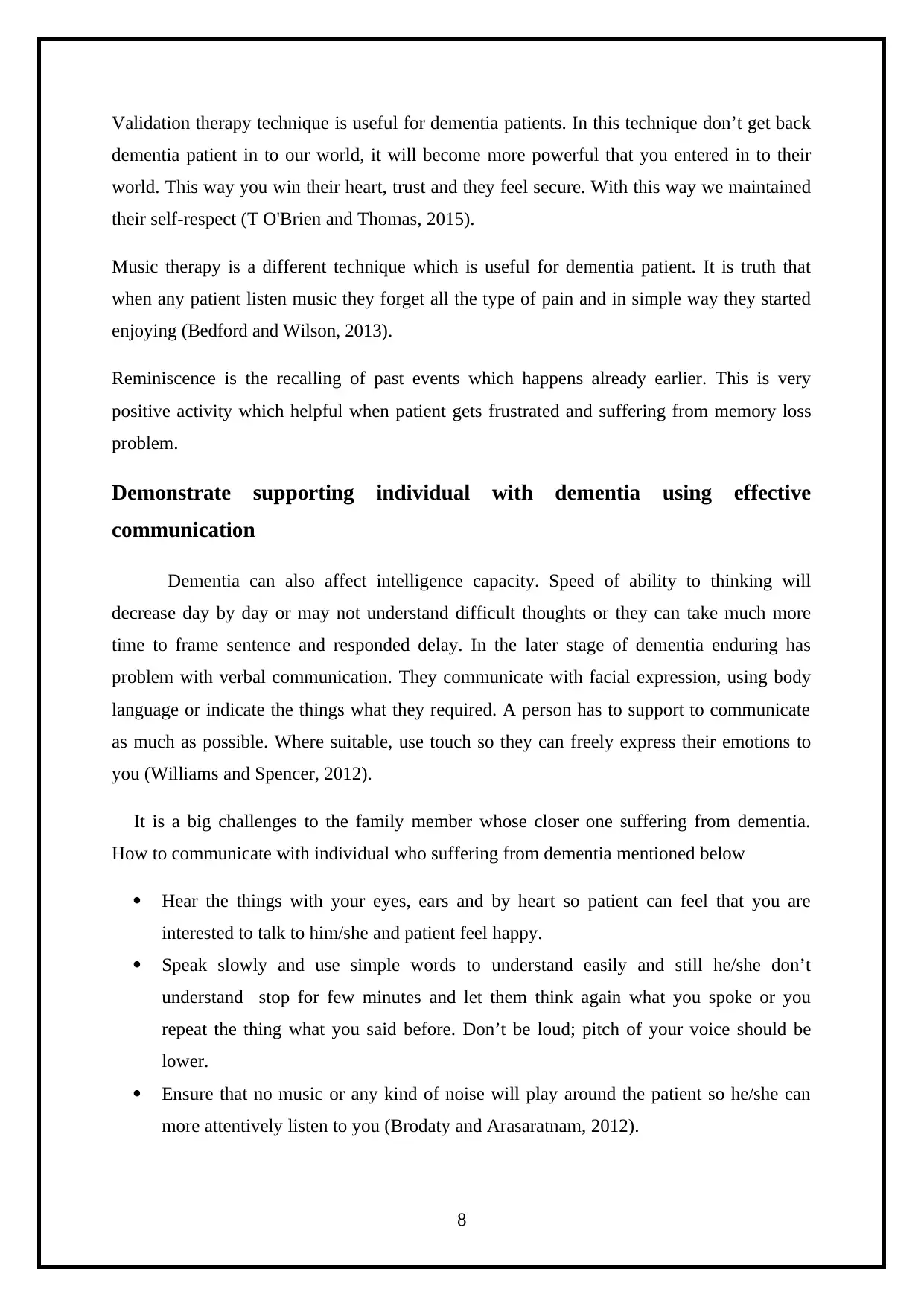
Validation therapy technique is useful for dementia patients. In this technique don’t get back
dementia patient in to our world, it will become more powerful that you entered in to their
world. This way you win their heart, trust and they feel secure. With this way we maintained
their self-respect (T O'Brien and Thomas, 2015).
Music therapy is a different technique which is useful for dementia patient. It is truth that
when any patient listen music they forget all the type of pain and in simple way they started
enjoying (Bedford and Wilson, 2013).
Reminiscence is the recalling of past events which happens already earlier. This is very
positive activity which helpful when patient gets frustrated and suffering from memory loss
problem.
Demonstrate supporting individual with dementia using effective
communication
Dementia can also affect intelligence capacity. Speed of ability to thinking will
decrease day by day or may not understand difficult thoughts or they can take much more
time to frame sentence and responded delay. In the later stage of dementia enduring has
problem with verbal communication. They communicate with facial expression, using body
language or indicate the things what they required. A person has to support to communicate
as much as possible. Where suitable, use touch so they can freely express their emotions to
you (Williams and Spencer, 2012).
It is a big challenges to the family member whose closer one suffering from dementia.
How to communicate with individual who suffering from dementia mentioned below
Hear the things with your eyes, ears and by heart so patient can feel that you are
interested to talk to him/she and patient feel happy.
Speak slowly and use simple words to understand easily and still he/she don’t
understand stop for few minutes and let them think again what you spoke or you
repeat the thing what you said before. Don’t be loud; pitch of your voice should be
lower.
Ensure that no music or any kind of noise will play around the patient so he/she can
more attentively listen to you (Brodaty and Arasaratnam, 2012).
8
dementia patient in to our world, it will become more powerful that you entered in to their
world. This way you win their heart, trust and they feel secure. With this way we maintained
their self-respect (T O'Brien and Thomas, 2015).
Music therapy is a different technique which is useful for dementia patient. It is truth that
when any patient listen music they forget all the type of pain and in simple way they started
enjoying (Bedford and Wilson, 2013).
Reminiscence is the recalling of past events which happens already earlier. This is very
positive activity which helpful when patient gets frustrated and suffering from memory loss
problem.
Demonstrate supporting individual with dementia using effective
communication
Dementia can also affect intelligence capacity. Speed of ability to thinking will
decrease day by day or may not understand difficult thoughts or they can take much more
time to frame sentence and responded delay. In the later stage of dementia enduring has
problem with verbal communication. They communicate with facial expression, using body
language or indicate the things what they required. A person has to support to communicate
as much as possible. Where suitable, use touch so they can freely express their emotions to
you (Williams and Spencer, 2012).
It is a big challenges to the family member whose closer one suffering from dementia.
How to communicate with individual who suffering from dementia mentioned below
Hear the things with your eyes, ears and by heart so patient can feel that you are
interested to talk to him/she and patient feel happy.
Speak slowly and use simple words to understand easily and still he/she don’t
understand stop for few minutes and let them think again what you spoke or you
repeat the thing what you said before. Don’t be loud; pitch of your voice should be
lower.
Ensure that no music or any kind of noise will play around the patient so he/she can
more attentively listen to you (Brodaty and Arasaratnam, 2012).
8
Secure Best Marks with AI Grader
Need help grading? Try our AI Grader for instant feedback on your assignments.
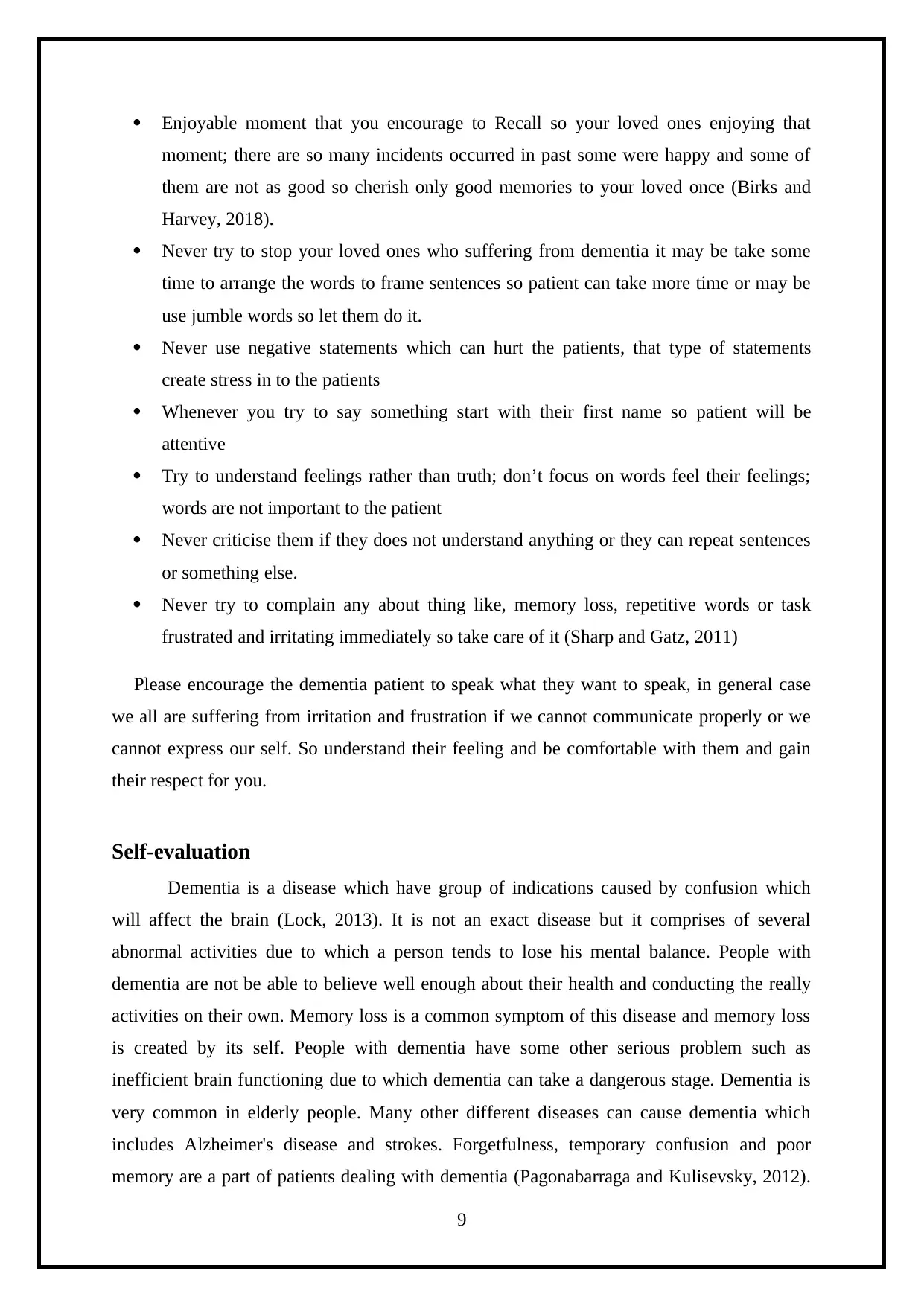
Enjoyable moment that you encourage to Recall so your loved ones enjoying that
moment; there are so many incidents occurred in past some were happy and some of
them are not as good so cherish only good memories to your loved once (Birks and
Harvey, 2018).
Never try to stop your loved ones who suffering from dementia it may be take some
time to arrange the words to frame sentences so patient can take more time or may be
use jumble words so let them do it.
Never use negative statements which can hurt the patients, that type of statements
create stress in to the patients
Whenever you try to say something start with their first name so patient will be
attentive
Try to understand feelings rather than truth; don’t focus on words feel their feelings;
words are not important to the patient
Never criticise them if they does not understand anything or they can repeat sentences
or something else.
Never try to complain any about thing like, memory loss, repetitive words or task
frustrated and irritating immediately so take care of it (Sharp and Gatz, 2011)
Please encourage the dementia patient to speak what they want to speak, in general case
we all are suffering from irritation and frustration if we cannot communicate properly or we
cannot express our self. So understand their feeling and be comfortable with them and gain
their respect for you.
Self-evaluation
Dementia is a disease which have group of indications caused by confusion which
will affect the brain (Lock, 2013). It is not an exact disease but it comprises of several
abnormal activities due to which a person tends to lose his mental balance. People with
dementia are not be able to believe well enough about their health and conducting the really
activities on their own. Memory loss is a common symptom of this disease and memory loss
is created by its self. People with dementia have some other serious problem such as
inefficient brain functioning due to which dementia can take a dangerous stage. Dementia is
very common in elderly people. Many other different diseases can cause dementia which
includes Alzheimer's disease and strokes. Forgetfulness, temporary confusion and poor
memory are a part of patients dealing with dementia (Pagonabarraga and Kulisevsky, 2012).
9
moment; there are so many incidents occurred in past some were happy and some of
them are not as good so cherish only good memories to your loved once (Birks and
Harvey, 2018).
Never try to stop your loved ones who suffering from dementia it may be take some
time to arrange the words to frame sentences so patient can take more time or may be
use jumble words so let them do it.
Never use negative statements which can hurt the patients, that type of statements
create stress in to the patients
Whenever you try to say something start with their first name so patient will be
attentive
Try to understand feelings rather than truth; don’t focus on words feel their feelings;
words are not important to the patient
Never criticise them if they does not understand anything or they can repeat sentences
or something else.
Never try to complain any about thing like, memory loss, repetitive words or task
frustrated and irritating immediately so take care of it (Sharp and Gatz, 2011)
Please encourage the dementia patient to speak what they want to speak, in general case
we all are suffering from irritation and frustration if we cannot communicate properly or we
cannot express our self. So understand their feeling and be comfortable with them and gain
their respect for you.
Self-evaluation
Dementia is a disease which have group of indications caused by confusion which
will affect the brain (Lock, 2013). It is not an exact disease but it comprises of several
abnormal activities due to which a person tends to lose his mental balance. People with
dementia are not be able to believe well enough about their health and conducting the really
activities on their own. Memory loss is a common symptom of this disease and memory loss
is created by its self. People with dementia have some other serious problem such as
inefficient brain functioning due to which dementia can take a dangerous stage. Dementia is
very common in elderly people. Many other different diseases can cause dementia which
includes Alzheimer's disease and strokes. Forgetfulness, temporary confusion and poor
memory are a part of patients dealing with dementia (Pagonabarraga and Kulisevsky, 2012).
9
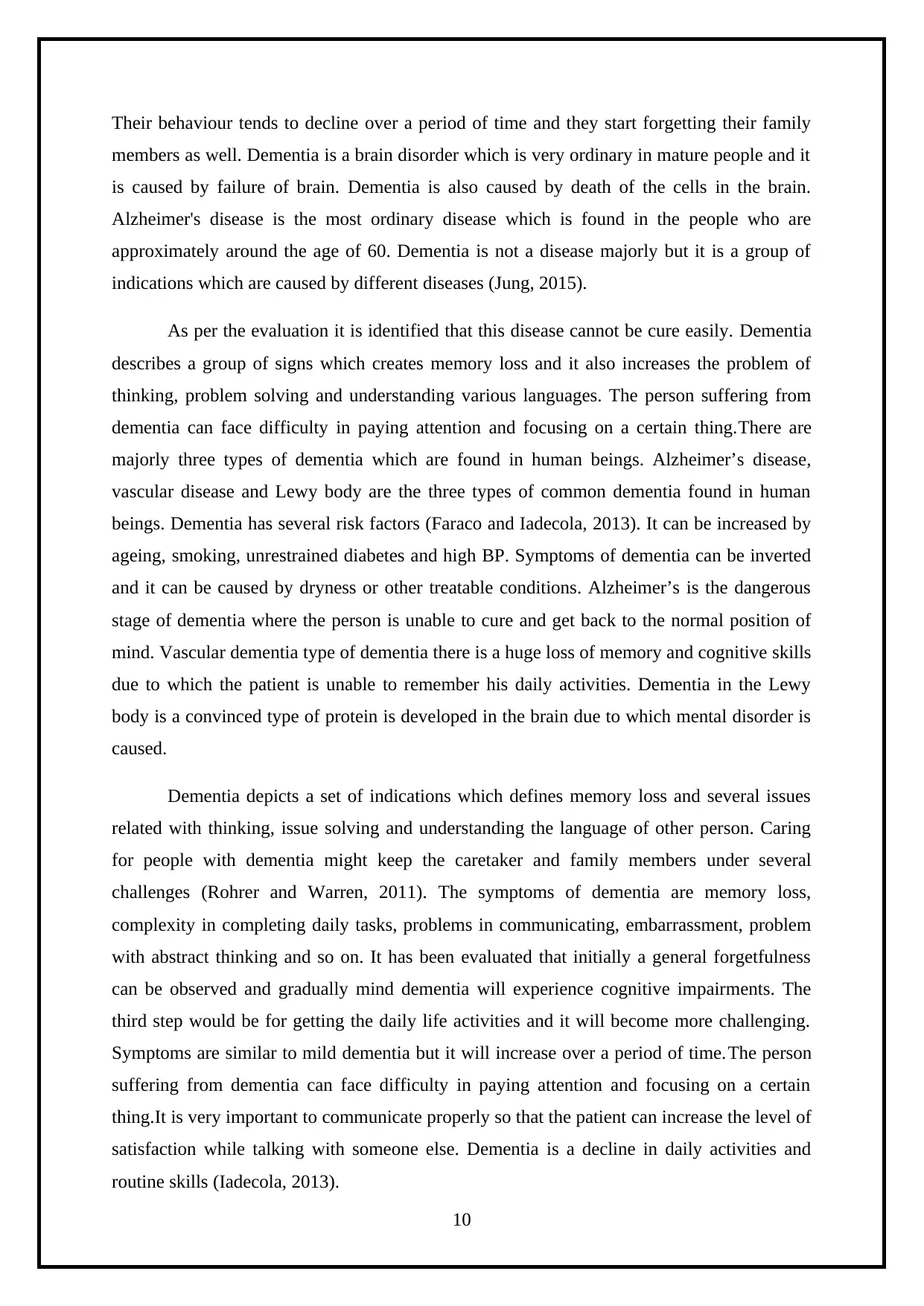
Their behaviour tends to decline over a period of time and they start forgetting their family
members as well. Dementia is a brain disorder which is very ordinary in mature people and it
is caused by failure of brain. Dementia is also caused by death of the cells in the brain.
Alzheimer's disease is the most ordinary disease which is found in the people who are
approximately around the age of 60. Dementia is not a disease majorly but it is a group of
indications which are caused by different diseases (Jung, 2015).
As per the evaluation it is identified that this disease cannot be cure easily. Dementia
describes a group of signs which creates memory loss and it also increases the problem of
thinking, problem solving and understanding various languages. The person suffering from
dementia can face difficulty in paying attention and focusing on a certain thing.There are
majorly three types of dementia which are found in human beings. Alzheimer’s disease,
vascular disease and Lewy body are the three types of common dementia found in human
beings. Dementia has several risk factors (Faraco and Iadecola, 2013). It can be increased by
ageing, smoking, unrestrained diabetes and high BP. Symptoms of dementia can be inverted
and it can be caused by dryness or other treatable conditions. Alzheimer’s is the dangerous
stage of dementia where the person is unable to cure and get back to the normal position of
mind. Vascular dementia type of dementia there is a huge loss of memory and cognitive skills
due to which the patient is unable to remember his daily activities. Dementia in the Lewy
body is a convinced type of protein is developed in the brain due to which mental disorder is
caused.
Dementia depicts a set of indications which defines memory loss and several issues
related with thinking, issue solving and understanding the language of other person. Caring
for people with dementia might keep the caretaker and family members under several
challenges (Rohrer and Warren, 2011). The symptoms of dementia are memory loss,
complexity in completing daily tasks, problems in communicating, embarrassment, problem
with abstract thinking and so on. It has been evaluated that initially a general forgetfulness
can be observed and gradually mind dementia will experience cognitive impairments. The
third step would be for getting the daily life activities and it will become more challenging.
Symptoms are similar to mild dementia but it will increase over a period of time.The person
suffering from dementia can face difficulty in paying attention and focusing on a certain
thing.It is very important to communicate properly so that the patient can increase the level of
satisfaction while talking with someone else. Dementia is a decline in daily activities and
routine skills (Iadecola, 2013).
10
members as well. Dementia is a brain disorder which is very ordinary in mature people and it
is caused by failure of brain. Dementia is also caused by death of the cells in the brain.
Alzheimer's disease is the most ordinary disease which is found in the people who are
approximately around the age of 60. Dementia is not a disease majorly but it is a group of
indications which are caused by different diseases (Jung, 2015).
As per the evaluation it is identified that this disease cannot be cure easily. Dementia
describes a group of signs which creates memory loss and it also increases the problem of
thinking, problem solving and understanding various languages. The person suffering from
dementia can face difficulty in paying attention and focusing on a certain thing.There are
majorly three types of dementia which are found in human beings. Alzheimer’s disease,
vascular disease and Lewy body are the three types of common dementia found in human
beings. Dementia has several risk factors (Faraco and Iadecola, 2013). It can be increased by
ageing, smoking, unrestrained diabetes and high BP. Symptoms of dementia can be inverted
and it can be caused by dryness or other treatable conditions. Alzheimer’s is the dangerous
stage of dementia where the person is unable to cure and get back to the normal position of
mind. Vascular dementia type of dementia there is a huge loss of memory and cognitive skills
due to which the patient is unable to remember his daily activities. Dementia in the Lewy
body is a convinced type of protein is developed in the brain due to which mental disorder is
caused.
Dementia depicts a set of indications which defines memory loss and several issues
related with thinking, issue solving and understanding the language of other person. Caring
for people with dementia might keep the caretaker and family members under several
challenges (Rohrer and Warren, 2011). The symptoms of dementia are memory loss,
complexity in completing daily tasks, problems in communicating, embarrassment, problem
with abstract thinking and so on. It has been evaluated that initially a general forgetfulness
can be observed and gradually mind dementia will experience cognitive impairments. The
third step would be for getting the daily life activities and it will become more challenging.
Symptoms are similar to mild dementia but it will increase over a period of time.The person
suffering from dementia can face difficulty in paying attention and focusing on a certain
thing.It is very important to communicate properly so that the patient can increase the level of
satisfaction while talking with someone else. Dementia is a decline in daily activities and
routine skills (Iadecola, 2013).
10
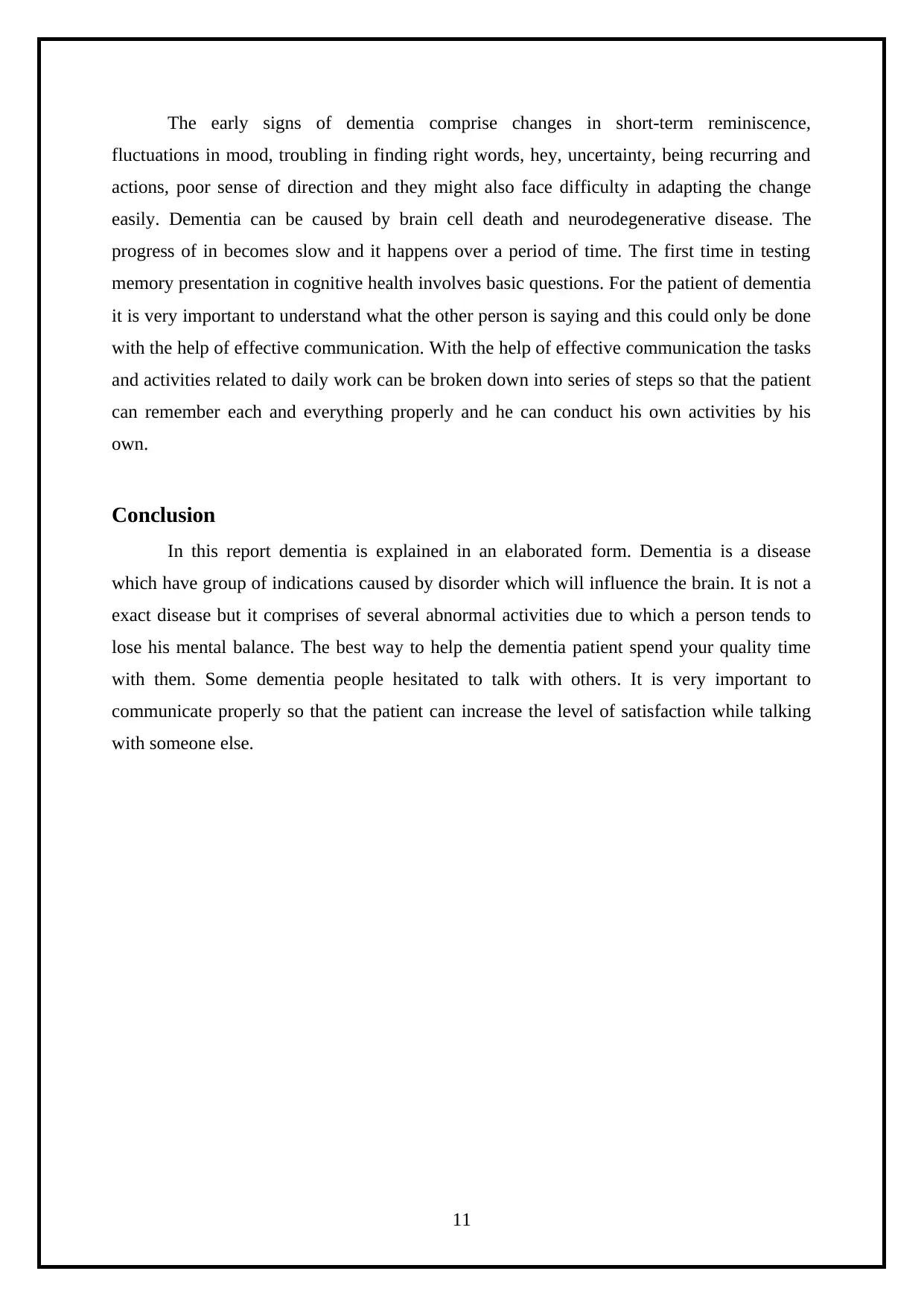
The early signs of dementia comprise changes in short-term reminiscence,
fluctuations in mood, troubling in finding right words, hey, uncertainty, being recurring and
actions, poor sense of direction and they might also face difficulty in adapting the change
easily. Dementia can be caused by brain cell death and neurodegenerative disease. The
progress of in becomes slow and it happens over a period of time. The first time in testing
memory presentation in cognitive health involves basic questions. For the patient of dementia
it is very important to understand what the other person is saying and this could only be done
with the help of effective communication. With the help of effective communication the tasks
and activities related to daily work can be broken down into series of steps so that the patient
can remember each and everything properly and he can conduct his own activities by his
own.
Conclusion
In this report dementia is explained in an elaborated form. Dementia is a disease
which have group of indications caused by disorder which will influence the brain. It is not a
exact disease but it comprises of several abnormal activities due to which a person tends to
lose his mental balance. The best way to help the dementia patient spend your quality time
with them. Some dementia people hesitated to talk with others. It is very important to
communicate properly so that the patient can increase the level of satisfaction while talking
with someone else.
11
fluctuations in mood, troubling in finding right words, hey, uncertainty, being recurring and
actions, poor sense of direction and they might also face difficulty in adapting the change
easily. Dementia can be caused by brain cell death and neurodegenerative disease. The
progress of in becomes slow and it happens over a period of time. The first time in testing
memory presentation in cognitive health involves basic questions. For the patient of dementia
it is very important to understand what the other person is saying and this could only be done
with the help of effective communication. With the help of effective communication the tasks
and activities related to daily work can be broken down into series of steps so that the patient
can remember each and everything properly and he can conduct his own activities by his
own.
Conclusion
In this report dementia is explained in an elaborated form. Dementia is a disease
which have group of indications caused by disorder which will influence the brain. It is not a
exact disease but it comprises of several abnormal activities due to which a person tends to
lose his mental balance. The best way to help the dementia patient spend your quality time
with them. Some dementia people hesitated to talk with others. It is very important to
communicate properly so that the patient can increase the level of satisfaction while talking
with someone else.
11
Paraphrase This Document
Need a fresh take? Get an instant paraphrase of this document with our AI Paraphraser
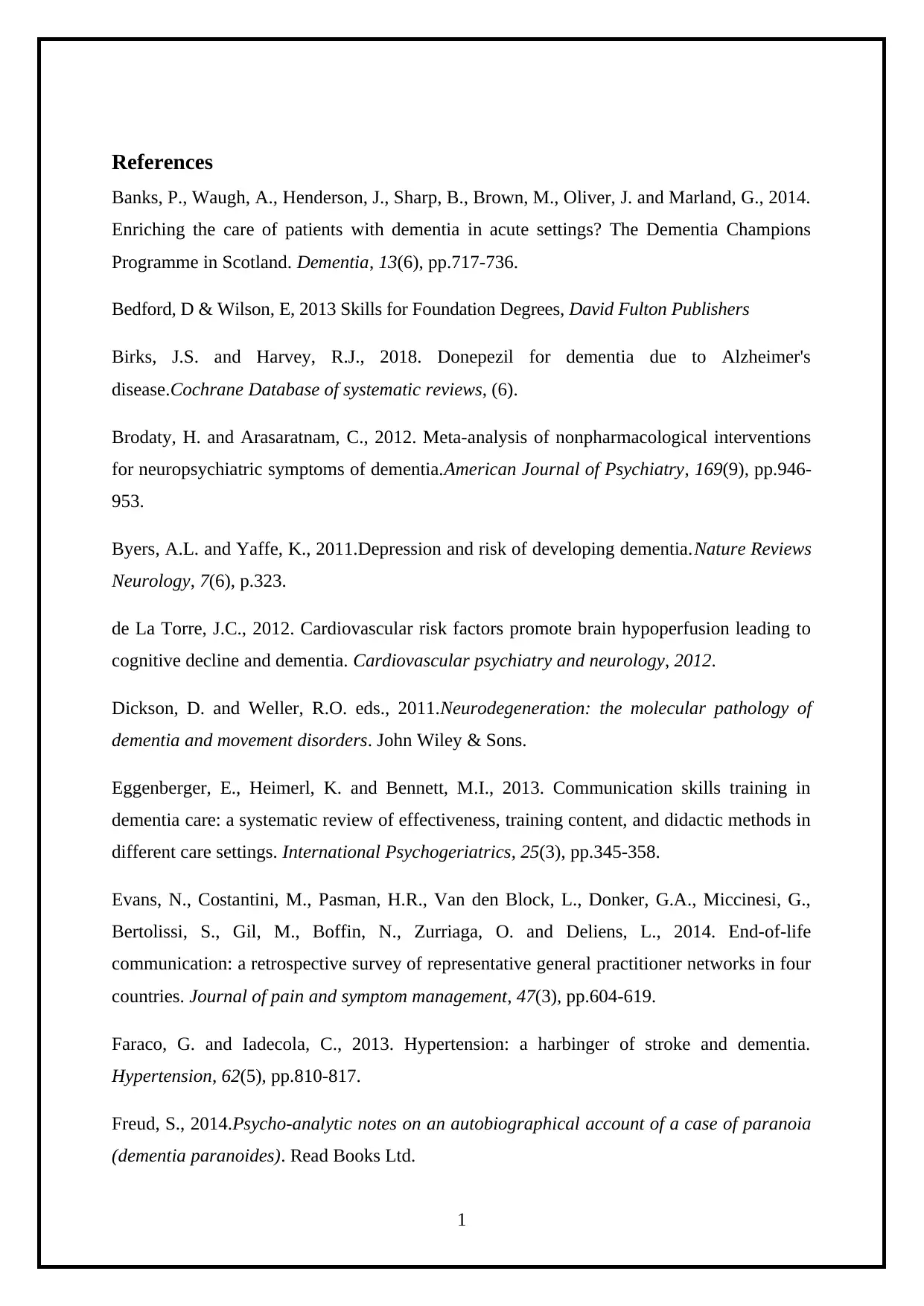
References
Banks, P., Waugh, A., Henderson, J., Sharp, B., Brown, M., Oliver, J. and Marland, G., 2014.
Enriching the care of patients with dementia in acute settings? The Dementia Champions
Programme in Scotland. Dementia, 13(6), pp.717-736.
Bedford, D & Wilson, E, 2013 Skills for Foundation Degrees, David Fulton Publishers
Birks, J.S. and Harvey, R.J., 2018. Donepezil for dementia due to Alzheimer's
disease.Cochrane Database of systematic reviews, (6).
Brodaty, H. and Arasaratnam, C., 2012. Meta-analysis of nonpharmacological interventions
for neuropsychiatric symptoms of dementia.American Journal of Psychiatry, 169(9), pp.946-
953.
Byers, A.L. and Yaffe, K., 2011.Depression and risk of developing dementia.Nature Reviews
Neurology, 7(6), p.323.
de La Torre, J.C., 2012. Cardiovascular risk factors promote brain hypoperfusion leading to
cognitive decline and dementia. Cardiovascular psychiatry and neurology, 2012.
Dickson, D. and Weller, R.O. eds., 2011.Neurodegeneration: the molecular pathology of
dementia and movement disorders. John Wiley & Sons.
Eggenberger, E., Heimerl, K. and Bennett, M.I., 2013. Communication skills training in
dementia care: a systematic review of effectiveness, training content, and didactic methods in
different care settings. International Psychogeriatrics, 25(3), pp.345-358.
Evans, N., Costantini, M., Pasman, H.R., Van den Block, L., Donker, G.A., Miccinesi, G.,
Bertolissi, S., Gil, M., Boffin, N., Zurriaga, O. and Deliens, L., 2014. End-of-life
communication: a retrospective survey of representative general practitioner networks in four
countries. Journal of pain and symptom management, 47(3), pp.604-619.
Faraco, G. and Iadecola, C., 2013. Hypertension: a harbinger of stroke and dementia.
Hypertension, 62(5), pp.810-817.
Freud, S., 2014.Psycho-analytic notes on an autobiographical account of a case of paranoia
(dementia paranoides). Read Books Ltd.
1
Banks, P., Waugh, A., Henderson, J., Sharp, B., Brown, M., Oliver, J. and Marland, G., 2014.
Enriching the care of patients with dementia in acute settings? The Dementia Champions
Programme in Scotland. Dementia, 13(6), pp.717-736.
Bedford, D & Wilson, E, 2013 Skills for Foundation Degrees, David Fulton Publishers
Birks, J.S. and Harvey, R.J., 2018. Donepezil for dementia due to Alzheimer's
disease.Cochrane Database of systematic reviews, (6).
Brodaty, H. and Arasaratnam, C., 2012. Meta-analysis of nonpharmacological interventions
for neuropsychiatric symptoms of dementia.American Journal of Psychiatry, 169(9), pp.946-
953.
Byers, A.L. and Yaffe, K., 2011.Depression and risk of developing dementia.Nature Reviews
Neurology, 7(6), p.323.
de La Torre, J.C., 2012. Cardiovascular risk factors promote brain hypoperfusion leading to
cognitive decline and dementia. Cardiovascular psychiatry and neurology, 2012.
Dickson, D. and Weller, R.O. eds., 2011.Neurodegeneration: the molecular pathology of
dementia and movement disorders. John Wiley & Sons.
Eggenberger, E., Heimerl, K. and Bennett, M.I., 2013. Communication skills training in
dementia care: a systematic review of effectiveness, training content, and didactic methods in
different care settings. International Psychogeriatrics, 25(3), pp.345-358.
Evans, N., Costantini, M., Pasman, H.R., Van den Block, L., Donker, G.A., Miccinesi, G.,
Bertolissi, S., Gil, M., Boffin, N., Zurriaga, O. and Deliens, L., 2014. End-of-life
communication: a retrospective survey of representative general practitioner networks in four
countries. Journal of pain and symptom management, 47(3), pp.604-619.
Faraco, G. and Iadecola, C., 2013. Hypertension: a harbinger of stroke and dementia.
Hypertension, 62(5), pp.810-817.
Freud, S., 2014.Psycho-analytic notes on an autobiographical account of a case of paranoia
(dementia paranoides). Read Books Ltd.
1
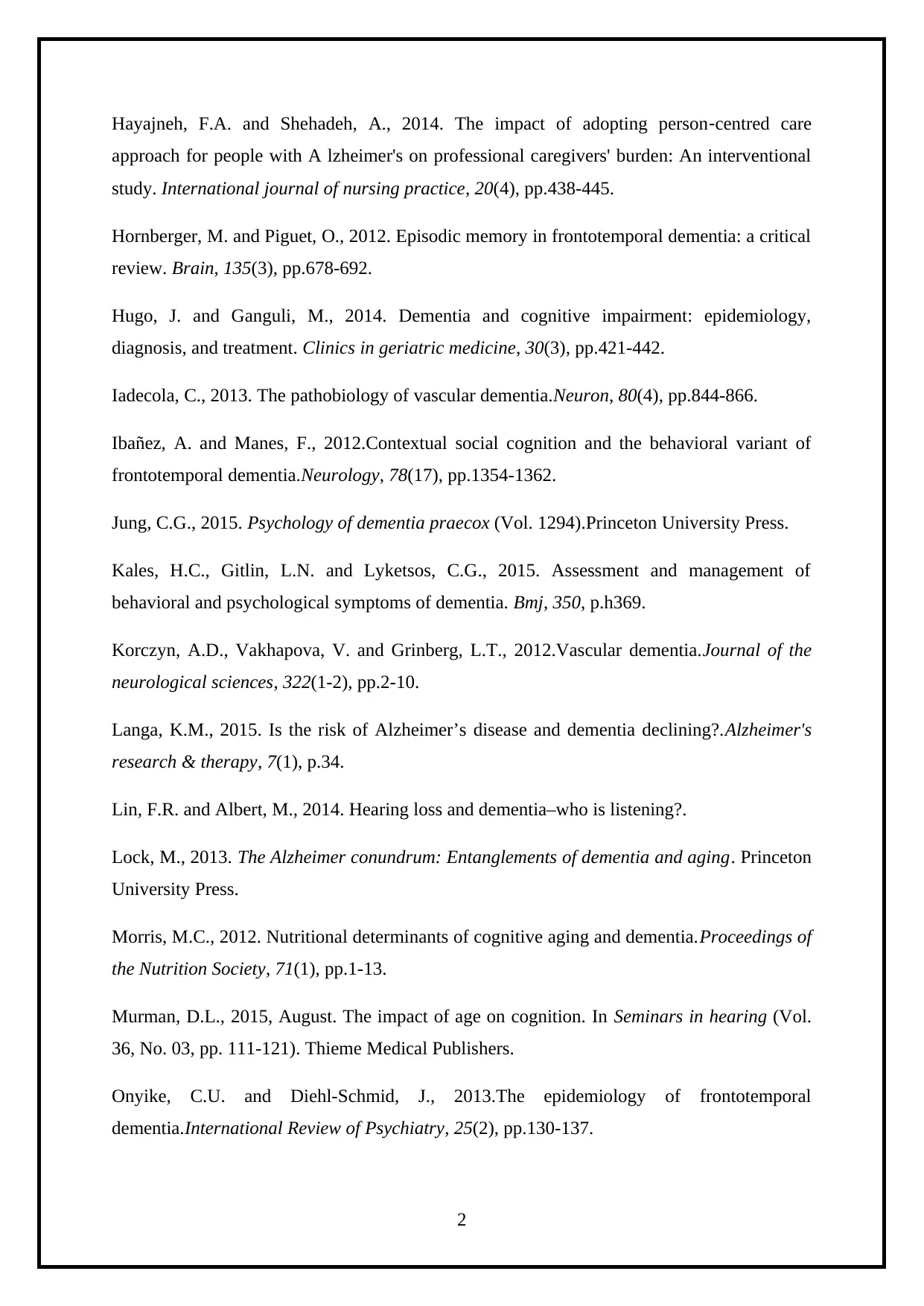
Hayajneh, F.A. and Shehadeh, A., 2014. The impact of adopting person‐centred care
approach for people with A lzheimer's on professional caregivers' burden: An interventional
study. International journal of nursing practice, 20(4), pp.438-445.
Hornberger, M. and Piguet, O., 2012. Episodic memory in frontotemporal dementia: a critical
review. Brain, 135(3), pp.678-692.
Hugo, J. and Ganguli, M., 2014. Dementia and cognitive impairment: epidemiology,
diagnosis, and treatment. Clinics in geriatric medicine, 30(3), pp.421-442.
Iadecola, C., 2013. The pathobiology of vascular dementia.Neuron, 80(4), pp.844-866.
Ibañez, A. and Manes, F., 2012.Contextual social cognition and the behavioral variant of
frontotemporal dementia.Neurology, 78(17), pp.1354-1362.
Jung, C.G., 2015. Psychology of dementia praecox (Vol. 1294).Princeton University Press.
Kales, H.C., Gitlin, L.N. and Lyketsos, C.G., 2015. Assessment and management of
behavioral and psychological symptoms of dementia. Bmj, 350, p.h369.
Korczyn, A.D., Vakhapova, V. and Grinberg, L.T., 2012.Vascular dementia.Journal of the
neurological sciences, 322(1-2), pp.2-10.
Langa, K.M., 2015. Is the risk of Alzheimer’s disease and dementia declining?.Alzheimer's
research & therapy, 7(1), p.34.
Lin, F.R. and Albert, M., 2014. Hearing loss and dementia–who is listening?.
Lock, M., 2013. The Alzheimer conundrum: Entanglements of dementia and aging. Princeton
University Press.
Morris, M.C., 2012. Nutritional determinants of cognitive aging and dementia.Proceedings of
the Nutrition Society, 71(1), pp.1-13.
Murman, D.L., 2015, August. The impact of age on cognition. In Seminars in hearing (Vol.
36, No. 03, pp. 111-121). Thieme Medical Publishers.
Onyike, C.U. and Diehl-Schmid, J., 2013.The epidemiology of frontotemporal
dementia.International Review of Psychiatry, 25(2), pp.130-137.
2
approach for people with A lzheimer's on professional caregivers' burden: An interventional
study. International journal of nursing practice, 20(4), pp.438-445.
Hornberger, M. and Piguet, O., 2012. Episodic memory in frontotemporal dementia: a critical
review. Brain, 135(3), pp.678-692.
Hugo, J. and Ganguli, M., 2014. Dementia and cognitive impairment: epidemiology,
diagnosis, and treatment. Clinics in geriatric medicine, 30(3), pp.421-442.
Iadecola, C., 2013. The pathobiology of vascular dementia.Neuron, 80(4), pp.844-866.
Ibañez, A. and Manes, F., 2012.Contextual social cognition and the behavioral variant of
frontotemporal dementia.Neurology, 78(17), pp.1354-1362.
Jung, C.G., 2015. Psychology of dementia praecox (Vol. 1294).Princeton University Press.
Kales, H.C., Gitlin, L.N. and Lyketsos, C.G., 2015. Assessment and management of
behavioral and psychological symptoms of dementia. Bmj, 350, p.h369.
Korczyn, A.D., Vakhapova, V. and Grinberg, L.T., 2012.Vascular dementia.Journal of the
neurological sciences, 322(1-2), pp.2-10.
Langa, K.M., 2015. Is the risk of Alzheimer’s disease and dementia declining?.Alzheimer's
research & therapy, 7(1), p.34.
Lin, F.R. and Albert, M., 2014. Hearing loss and dementia–who is listening?.
Lock, M., 2013. The Alzheimer conundrum: Entanglements of dementia and aging. Princeton
University Press.
Morris, M.C., 2012. Nutritional determinants of cognitive aging and dementia.Proceedings of
the Nutrition Society, 71(1), pp.1-13.
Murman, D.L., 2015, August. The impact of age on cognition. In Seminars in hearing (Vol.
36, No. 03, pp. 111-121). Thieme Medical Publishers.
Onyike, C.U. and Diehl-Schmid, J., 2013.The epidemiology of frontotemporal
dementia.International Review of Psychiatry, 25(2), pp.130-137.
2
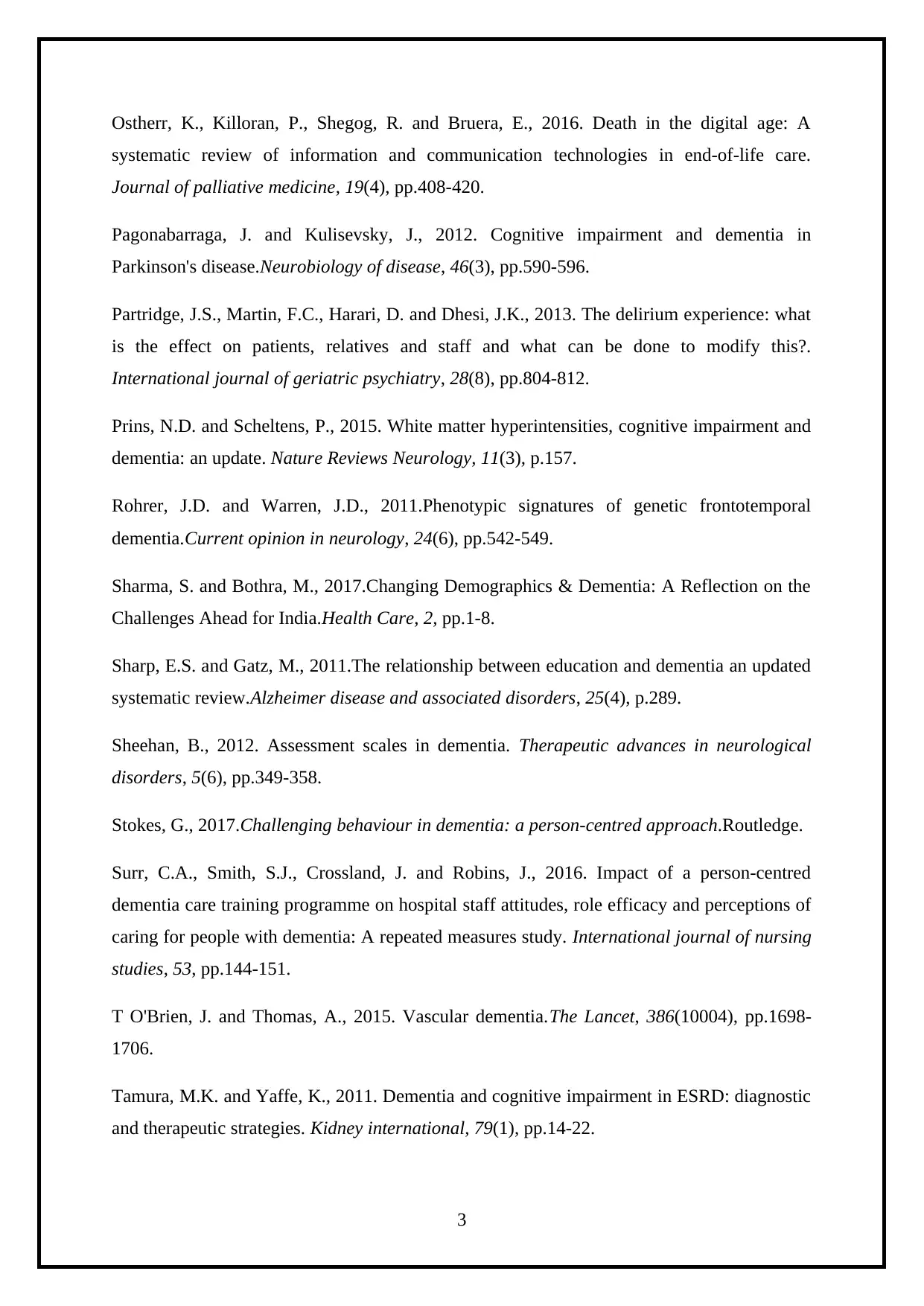
Ostherr, K., Killoran, P., Shegog, R. and Bruera, E., 2016. Death in the digital age: A
systematic review of information and communication technologies in end-of-life care.
Journal of palliative medicine, 19(4), pp.408-420.
Pagonabarraga, J. and Kulisevsky, J., 2012. Cognitive impairment and dementia in
Parkinson's disease.Neurobiology of disease, 46(3), pp.590-596.
Partridge, J.S., Martin, F.C., Harari, D. and Dhesi, J.K., 2013. The delirium experience: what
is the effect on patients, relatives and staff and what can be done to modify this?.
International journal of geriatric psychiatry, 28(8), pp.804-812.
Prins, N.D. and Scheltens, P., 2015. White matter hyperintensities, cognitive impairment and
dementia: an update. Nature Reviews Neurology, 11(3), p.157.
Rohrer, J.D. and Warren, J.D., 2011.Phenotypic signatures of genetic frontotemporal
dementia.Current opinion in neurology, 24(6), pp.542-549.
Sharma, S. and Bothra, M., 2017.Changing Demographics & Dementia: A Reflection on the
Challenges Ahead for India.Health Care, 2, pp.1-8.
Sharp, E.S. and Gatz, M., 2011.The relationship between education and dementia an updated
systematic review.Alzheimer disease and associated disorders, 25(4), p.289.
Sheehan, B., 2012. Assessment scales in dementia. Therapeutic advances in neurological
disorders, 5(6), pp.349-358.
Stokes, G., 2017.Challenging behaviour in dementia: a person-centred approach.Routledge.
Surr, C.A., Smith, S.J., Crossland, J. and Robins, J., 2016. Impact of a person-centred
dementia care training programme on hospital staff attitudes, role efficacy and perceptions of
caring for people with dementia: A repeated measures study. International journal of nursing
studies, 53, pp.144-151.
T O'Brien, J. and Thomas, A., 2015. Vascular dementia.The Lancet, 386(10004), pp.1698-
1706.
Tamura, M.K. and Yaffe, K., 2011. Dementia and cognitive impairment in ESRD: diagnostic
and therapeutic strategies. Kidney international, 79(1), pp.14-22.
3
systematic review of information and communication technologies in end-of-life care.
Journal of palliative medicine, 19(4), pp.408-420.
Pagonabarraga, J. and Kulisevsky, J., 2012. Cognitive impairment and dementia in
Parkinson's disease.Neurobiology of disease, 46(3), pp.590-596.
Partridge, J.S., Martin, F.C., Harari, D. and Dhesi, J.K., 2013. The delirium experience: what
is the effect on patients, relatives and staff and what can be done to modify this?.
International journal of geriatric psychiatry, 28(8), pp.804-812.
Prins, N.D. and Scheltens, P., 2015. White matter hyperintensities, cognitive impairment and
dementia: an update. Nature Reviews Neurology, 11(3), p.157.
Rohrer, J.D. and Warren, J.D., 2011.Phenotypic signatures of genetic frontotemporal
dementia.Current opinion in neurology, 24(6), pp.542-549.
Sharma, S. and Bothra, M., 2017.Changing Demographics & Dementia: A Reflection on the
Challenges Ahead for India.Health Care, 2, pp.1-8.
Sharp, E.S. and Gatz, M., 2011.The relationship between education and dementia an updated
systematic review.Alzheimer disease and associated disorders, 25(4), p.289.
Sheehan, B., 2012. Assessment scales in dementia. Therapeutic advances in neurological
disorders, 5(6), pp.349-358.
Stokes, G., 2017.Challenging behaviour in dementia: a person-centred approach.Routledge.
Surr, C.A., Smith, S.J., Crossland, J. and Robins, J., 2016. Impact of a person-centred
dementia care training programme on hospital staff attitudes, role efficacy and perceptions of
caring for people with dementia: A repeated measures study. International journal of nursing
studies, 53, pp.144-151.
T O'Brien, J. and Thomas, A., 2015. Vascular dementia.The Lancet, 386(10004), pp.1698-
1706.
Tamura, M.K. and Yaffe, K., 2011. Dementia and cognitive impairment in ESRD: diagnostic
and therapeutic strategies. Kidney international, 79(1), pp.14-22.
3
Secure Best Marks with AI Grader
Need help grading? Try our AI Grader for instant feedback on your assignments.
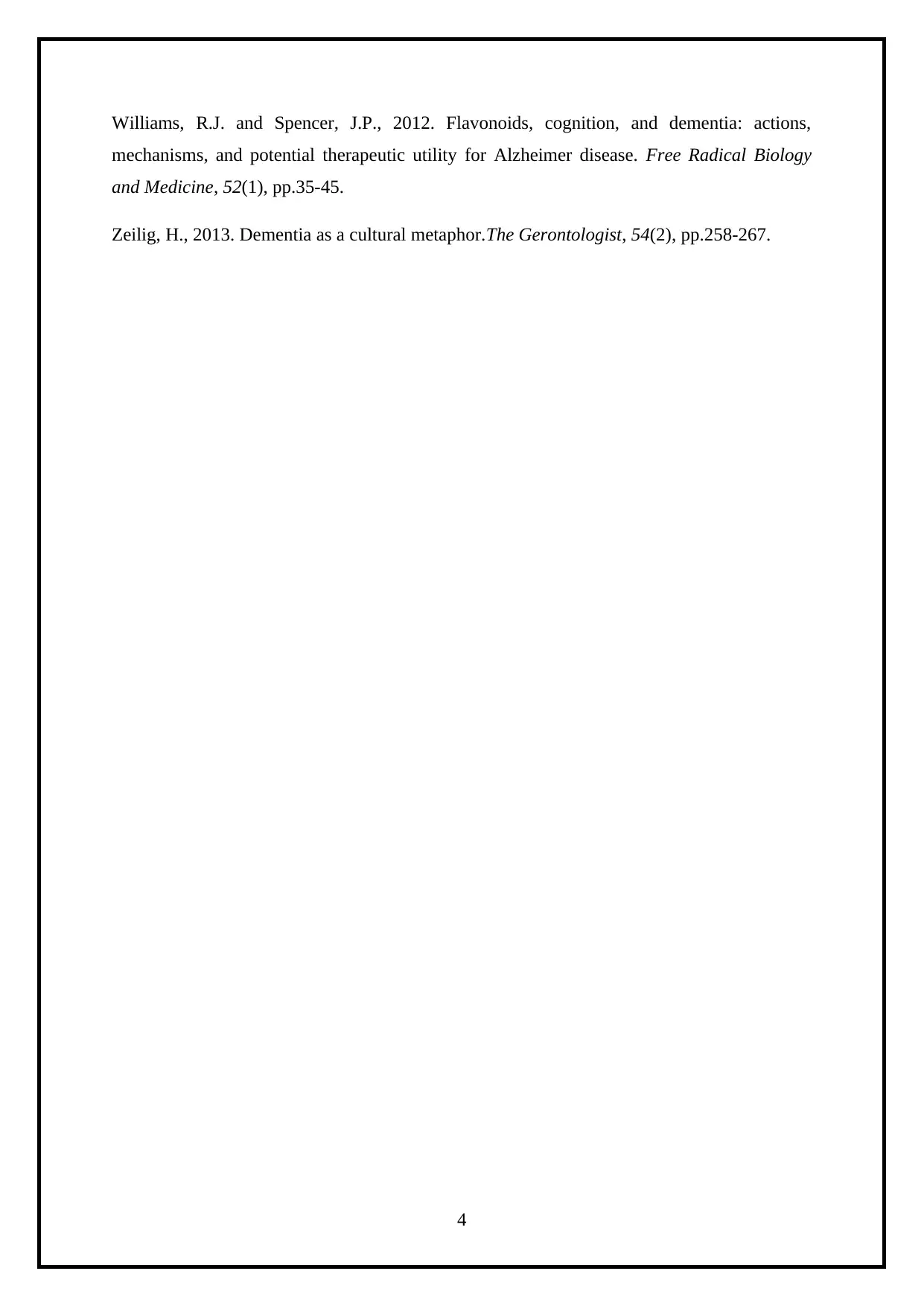
Williams, R.J. and Spencer, J.P., 2012. Flavonoids, cognition, and dementia: actions,
mechanisms, and potential therapeutic utility for Alzheimer disease. Free Radical Biology
and Medicine, 52(1), pp.35-45.
Zeilig, H., 2013. Dementia as a cultural metaphor.The Gerontologist, 54(2), pp.258-267.
4
mechanisms, and potential therapeutic utility for Alzheimer disease. Free Radical Biology
and Medicine, 52(1), pp.35-45.
Zeilig, H., 2013. Dementia as a cultural metaphor.The Gerontologist, 54(2), pp.258-267.
4
1 out of 17
Related Documents
Your All-in-One AI-Powered Toolkit for Academic Success.
+13062052269
info@desklib.com
Available 24*7 on WhatsApp / Email
![[object Object]](/_next/static/media/star-bottom.7253800d.svg)
Unlock your academic potential
© 2024 | Zucol Services PVT LTD | All rights reserved.





